This is part of my ongoing series in which I compare four translations of Final Fantasy VI with the original Japanese script. For project details and my translation notes from Day 1, see here.
Part 2: South Figaro to Banon
Given the pace from Day 1, I assumed that we’d get to the Returners hideout by the end of Day 2, and that turned out to be pretty much spot on.
I’ve also learned from Day 1 and Day 2 that putting these write-ups together takes a lot of time, so I’ve decided to stream each new day only when the previous day’s notes are finally posted.
Video Archive
Notes
I’ve summarized a lot of my findings from Day 2 below, but note that I actually covered much more during the live stream – these are just some of the highlights. See the Day 2 video for many more thoughts and comments.
Yellow Green Cherry
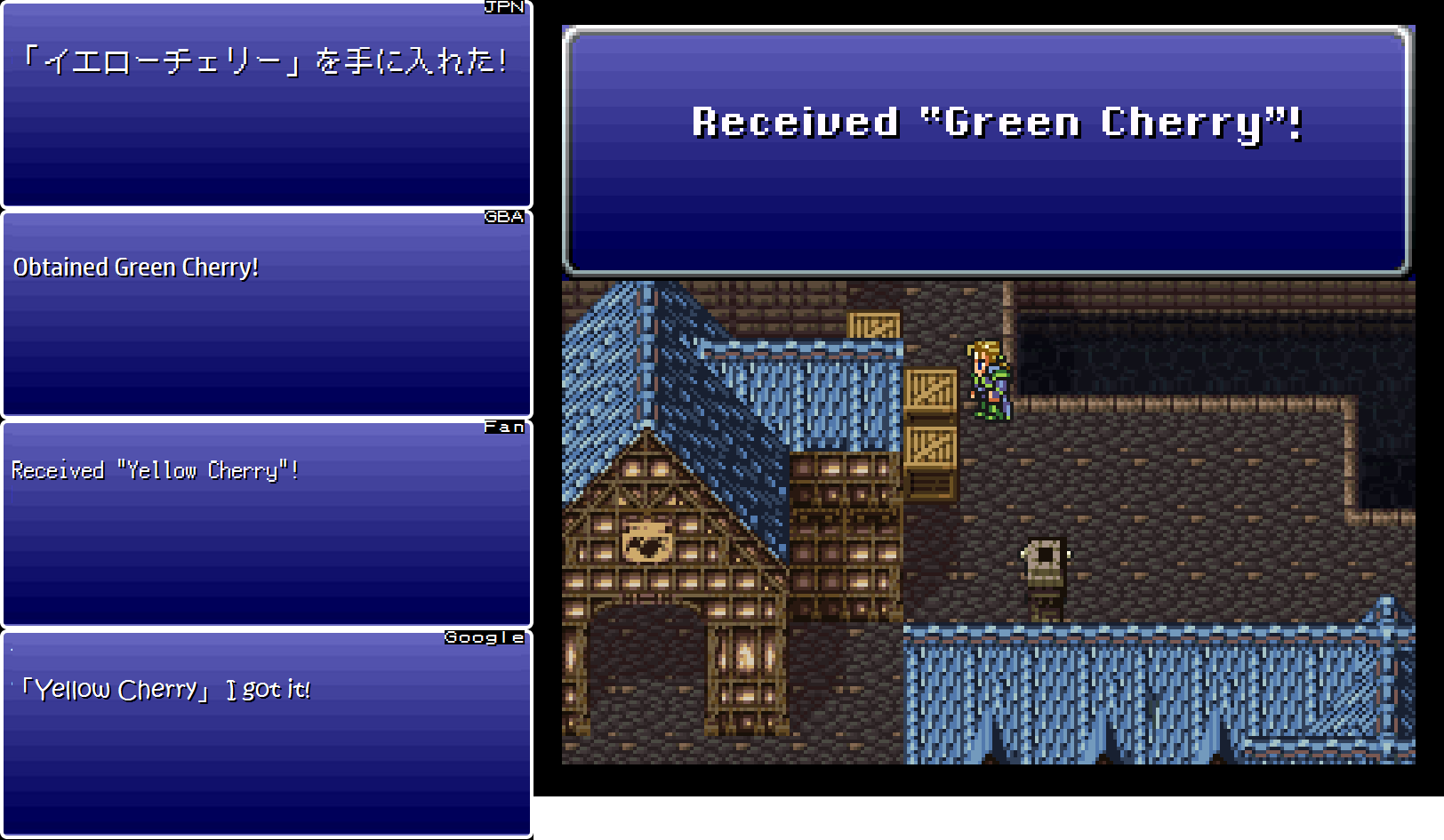
The “Yellow Cherry” item in the Japanese version is renamed “Green Cherry” in the Super NES and GBA translations. I always assumed that the name was changed due to name length limitations back in the day, but I’ve never really checked to see if it fits or not. I’m guessing the GBA translation left it as “Green Cherry” to stay consistent with the original translation. Does the item even appear in any later games?
From a strictly player’s perspective, I do kind of prefer “Green Cherry”, not necessarily because it was the first name I knew it by, but because it matches the color of the kappa/imp transformation that this item cures.
Oxford Commas are Important
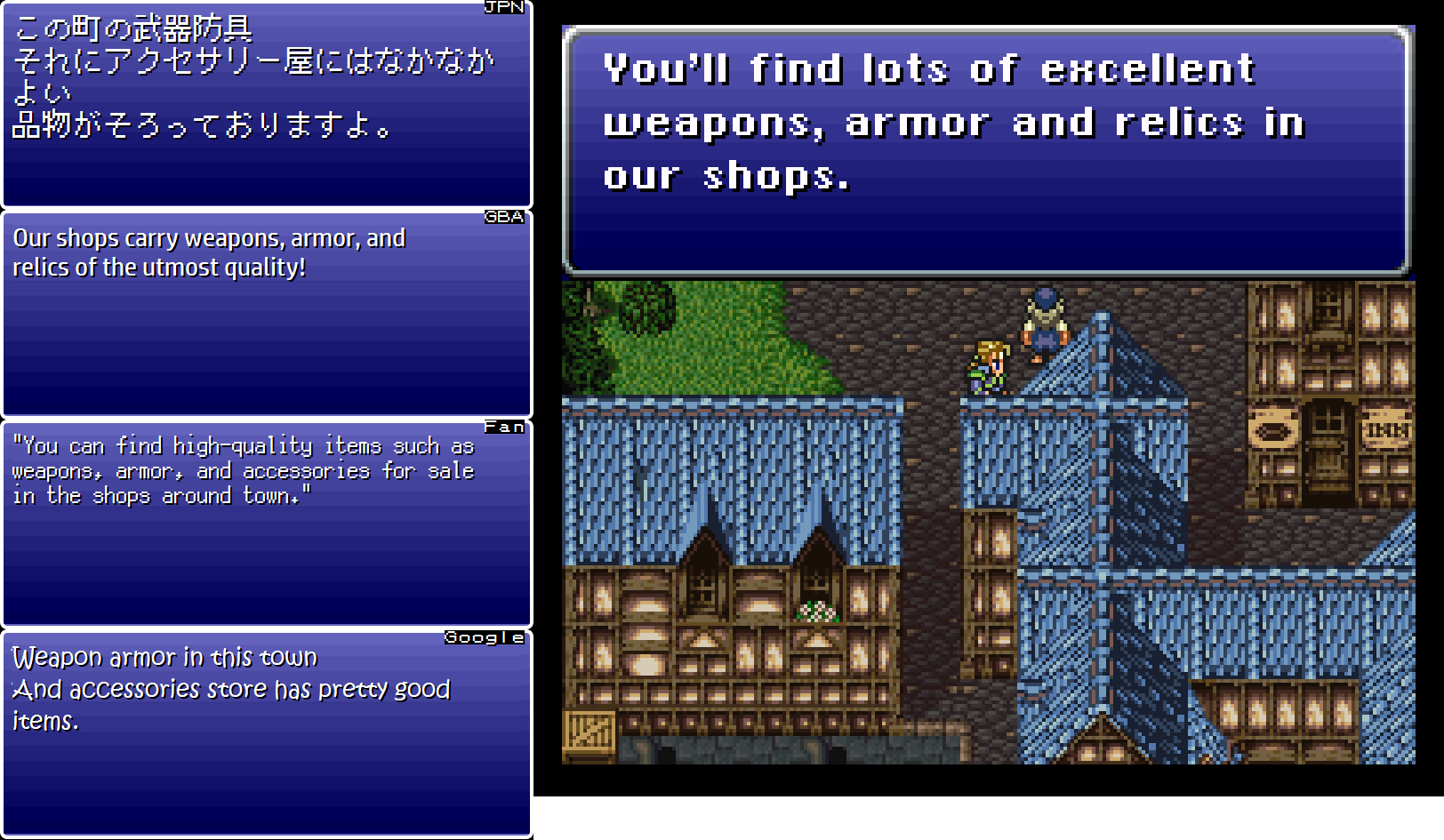
In this line, we see that the Super NES translation lists the three shops as: weapons, armor and relics
In the GBA translation, this line was edited to use the much-debated Oxford comma: weapons, armor, and relics
This makes me wonder if Square Enix has put certain standards in place or if it was just the GBA translator’s preferred style. Whatever the case, I never expected the topic of Oxford commas to come up during this project!

Incidentally, it looks like the fan translator preferred the Oxford comma too.
Saber Tooth Mountains
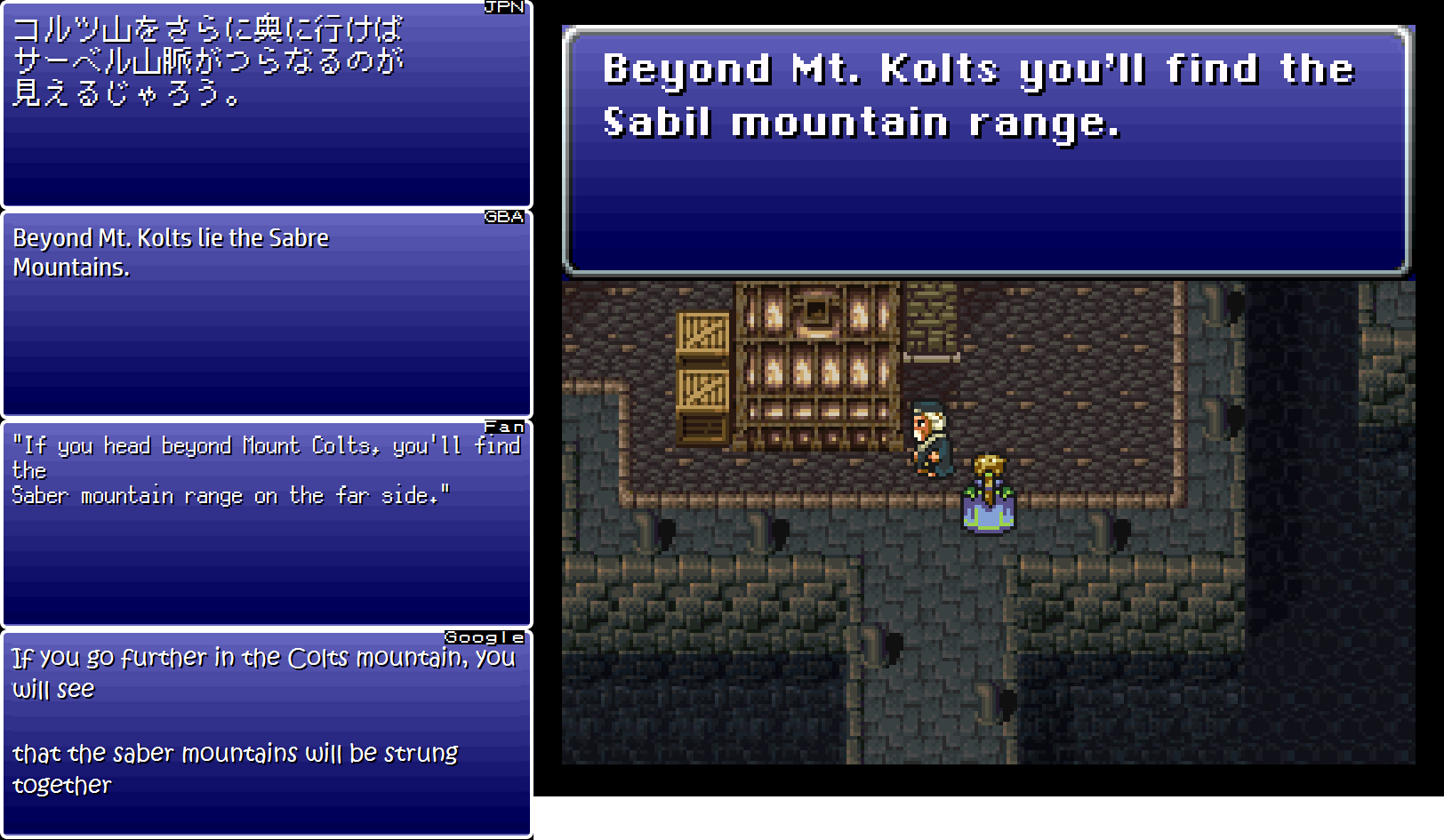
In the Japanese script, the mountains are called the サベール (sabēru) Mountains. I’ve seen this word enough to instantly recognize it’s also the Japanese name for a “saber”, and that it was imported into the Japanese language via Portuguese.
If you’ve studied Japanese, you know that the rules are really confusing and messy for how English words get written in Japanese. But the rules change between Japanese and other languages, so when a word comes from something like Italian, French, German, Portuguese, etc. there’s a good chance it’ll get written in katakana in a slightly different way than you’re used to.
In this case, the difference isn’t very big, but it was possibly enough to throw the Super NES translator off the right track. But as we’ll see later in this Day 2 section – and later in this entire comparison – this problem is a common, pesky obstacle for Japanese-to-English entertainment translators.
Stand Up to the Empire
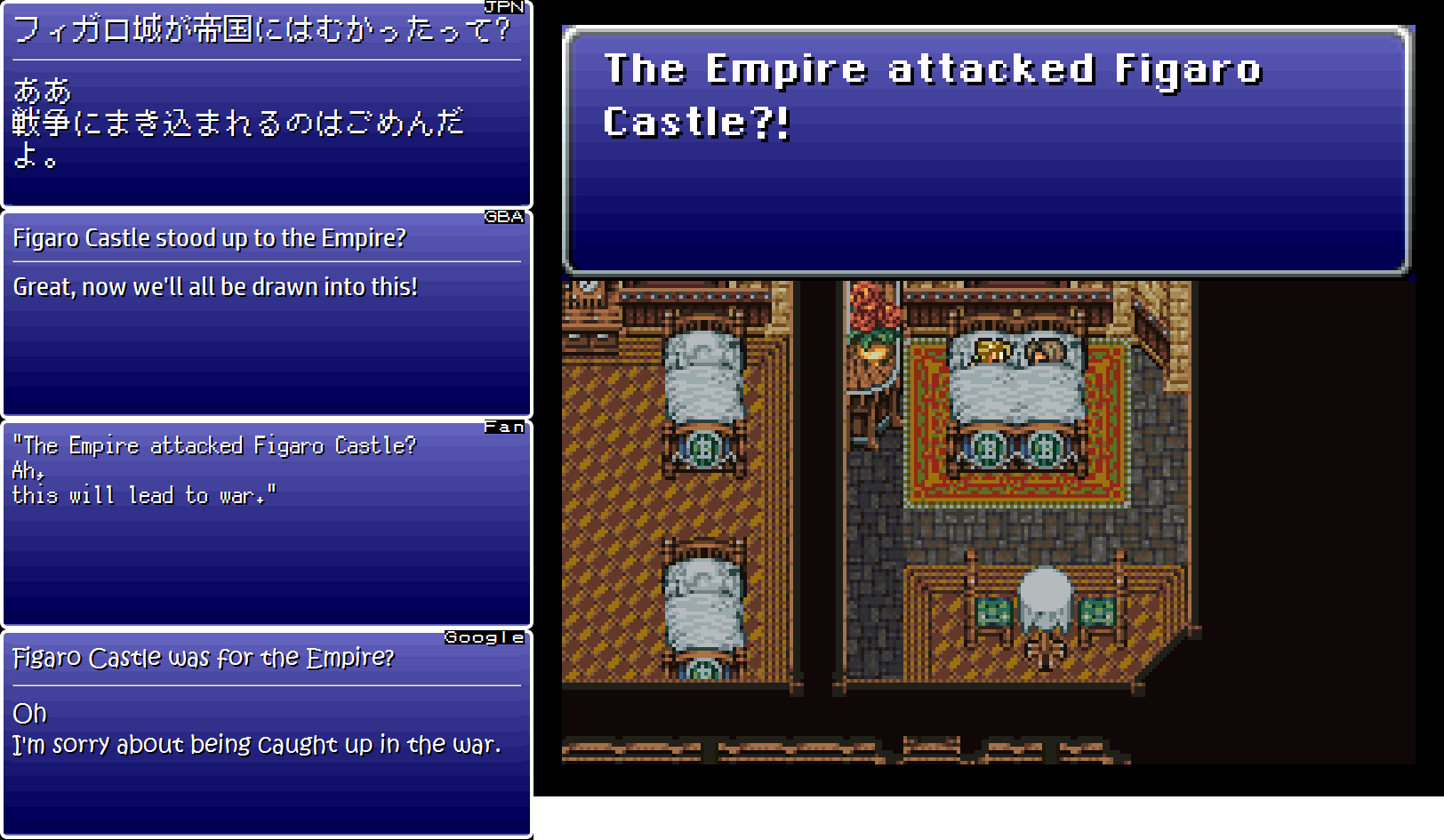
In Japanese, this guy says something like , “Figaro Castle stood up to the Empire? Aww man, I really don’t wanna get caught up in the war.” The unstated idea is that the guy thinks Figaro Castle was stupid to stand up to the Empire and cause conflict rather than stay allied with it.
In the Super NES translation, we see that the line changed a bit: “The Empire attacked Figaro Castle?! Now we’ll all be drawn into the battle!” The idea that Figaro Castle stood up to the Empire is gone and makes the Empire the focus of the statement. By itself this change isn’t too major – I only bring it up because we can see that the fan translation has somehow made the exact same change.
Pubs n’ Cafes
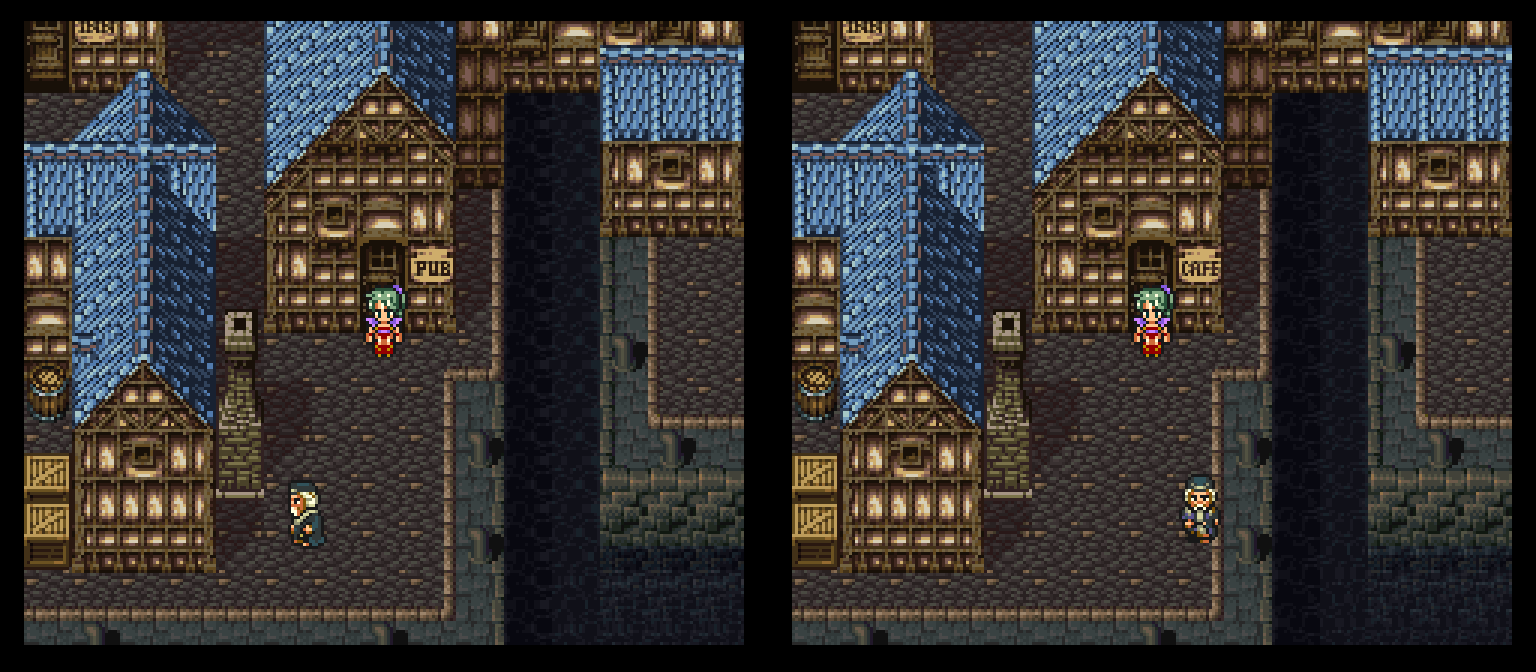
It’s well-known that the pubs in Final Fantasy VI were changed into cafes for the Super NES localization. Even the little building signs had to be graphically changed, as seen above.

The same Super NES change is also seen inside the building, but the GBA translation reverts the cafe back into being a pub. Knowing this, I assume the GBA translation has the original “PUB” sign outside reverted back too.
It Ap-peers You Have a Twin
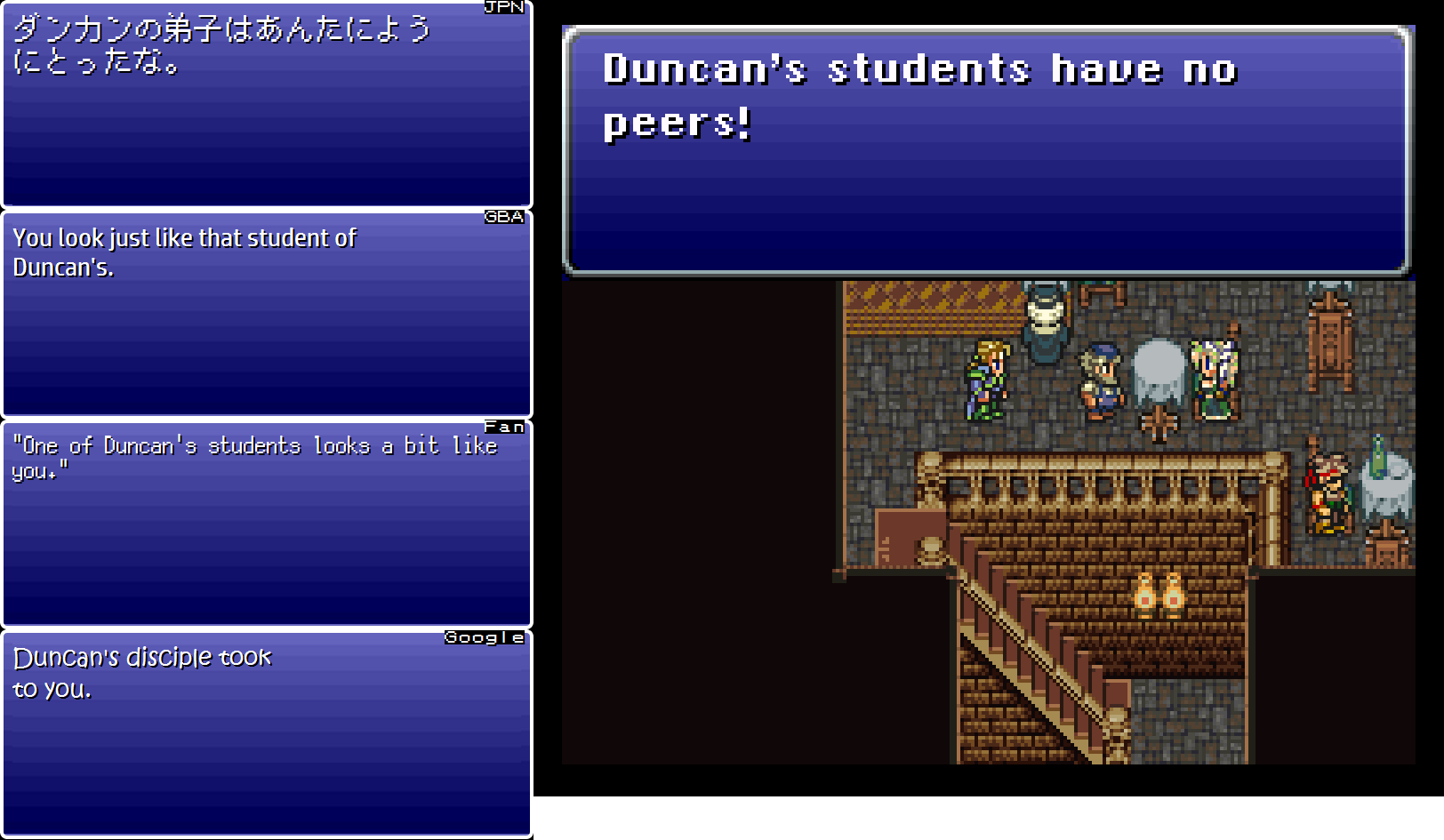
The Super NES translation gets this line wrong – in Japanese it’s: “You look a lot like Duncan’s pupil/student/disciple.” This is referring to the fact that Edgar is Sabin’s twin brother.
Vargas’ Goal
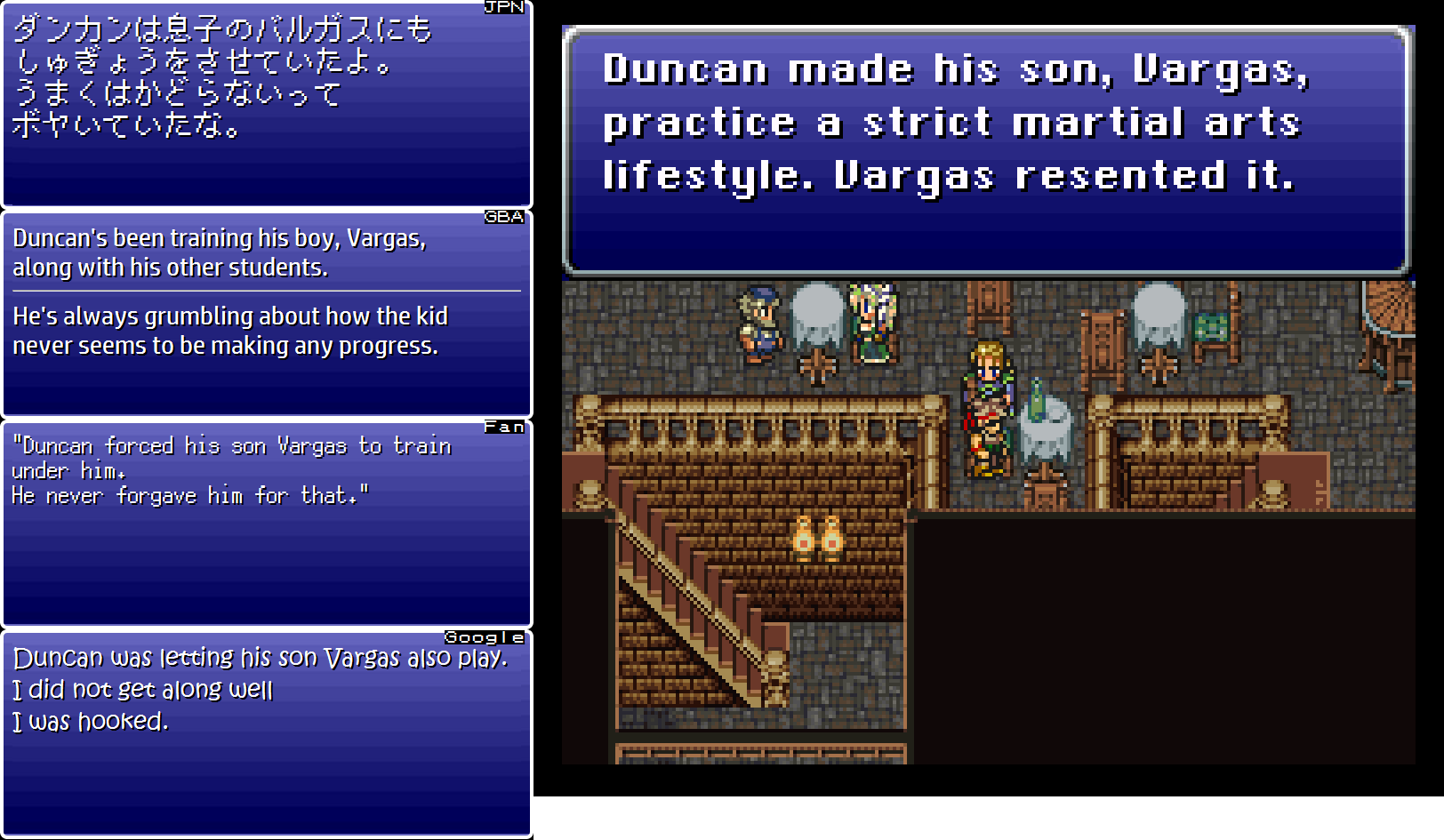
In Japanese this character says, “Duncan put his son through training too. He would always complain that it wasn’t going very well.”
In the Super NES version, we see that this is mistranslated as “Vargas resented it.” That’s not the case – in fact, Vargas really, really wants to be Duncan’s martial arts successor, enough to attack his fellow student as we soon learn.
We see that the GBA translation fixes this line, while the fan translation manages to make the same mistake as the Super NES translation.
Shadow’s Intro
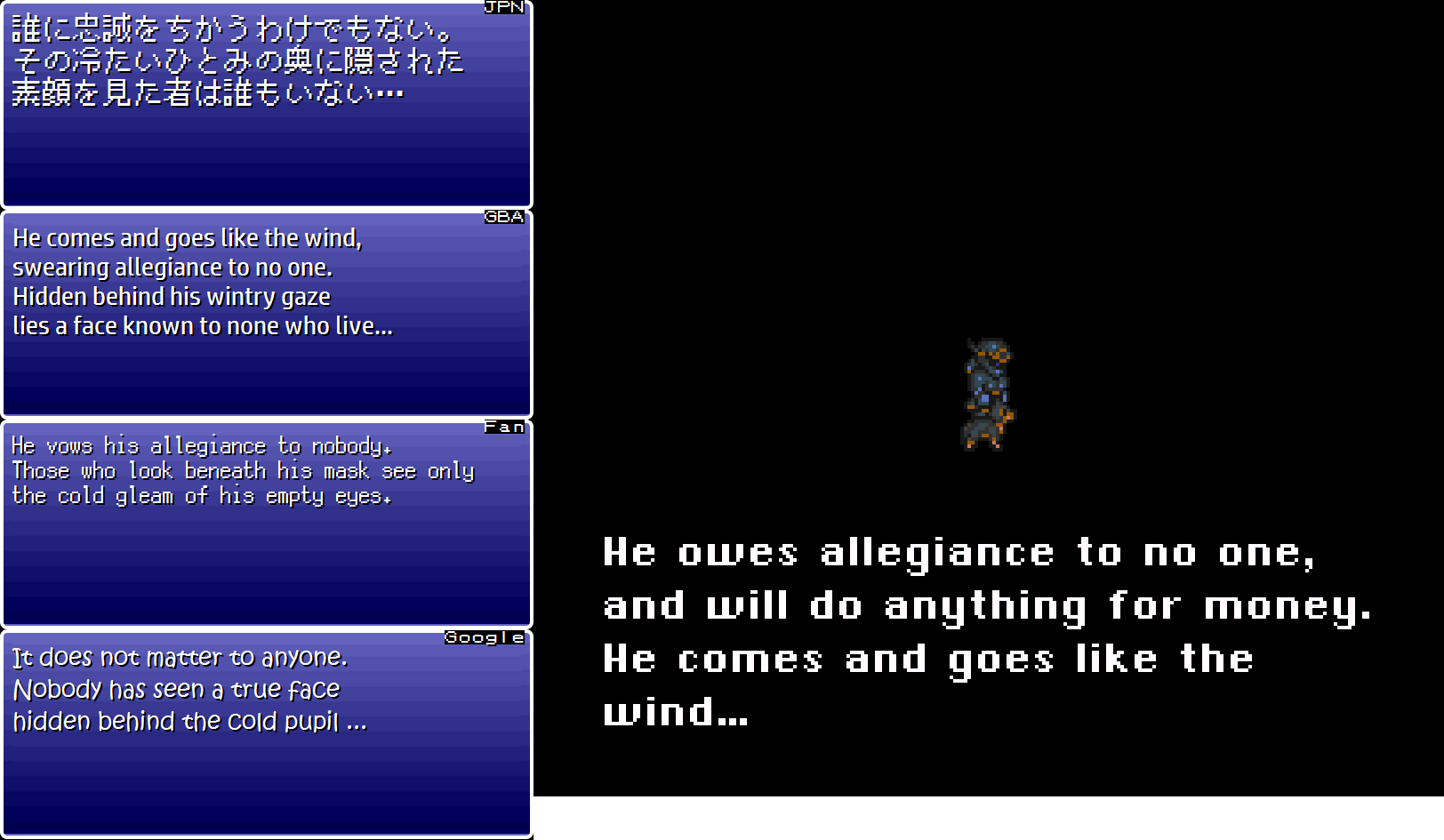
Shadow’s introduction is really cool and memorable in the Japanese script and the two official translations. The Super NES translation changes things quite a bit and adds stuff about “coming and going like the wind”.
The GBA translation moves things closer to the original text by talking about the cold eyes hidden beneath a mask and how no one has ever seen the face beneath the mask. At the same time, it pulls in the wind-related text from the Super NES translation. The result mixes an homage to the previous translation with closer faithfulness to the original script.
The fan script mistranslates this line – the original idea is that no one has seen beneath the mask.
Also, the word ひとみ (hitomi) can mean “pupil” in an anatomical sense but is also a sort of fanciful way of saying “eye/eyes” in other contexts. This overlapping usage is why Google’s translation talks about pupils.
Slittin’ Throats and Takin’ Money
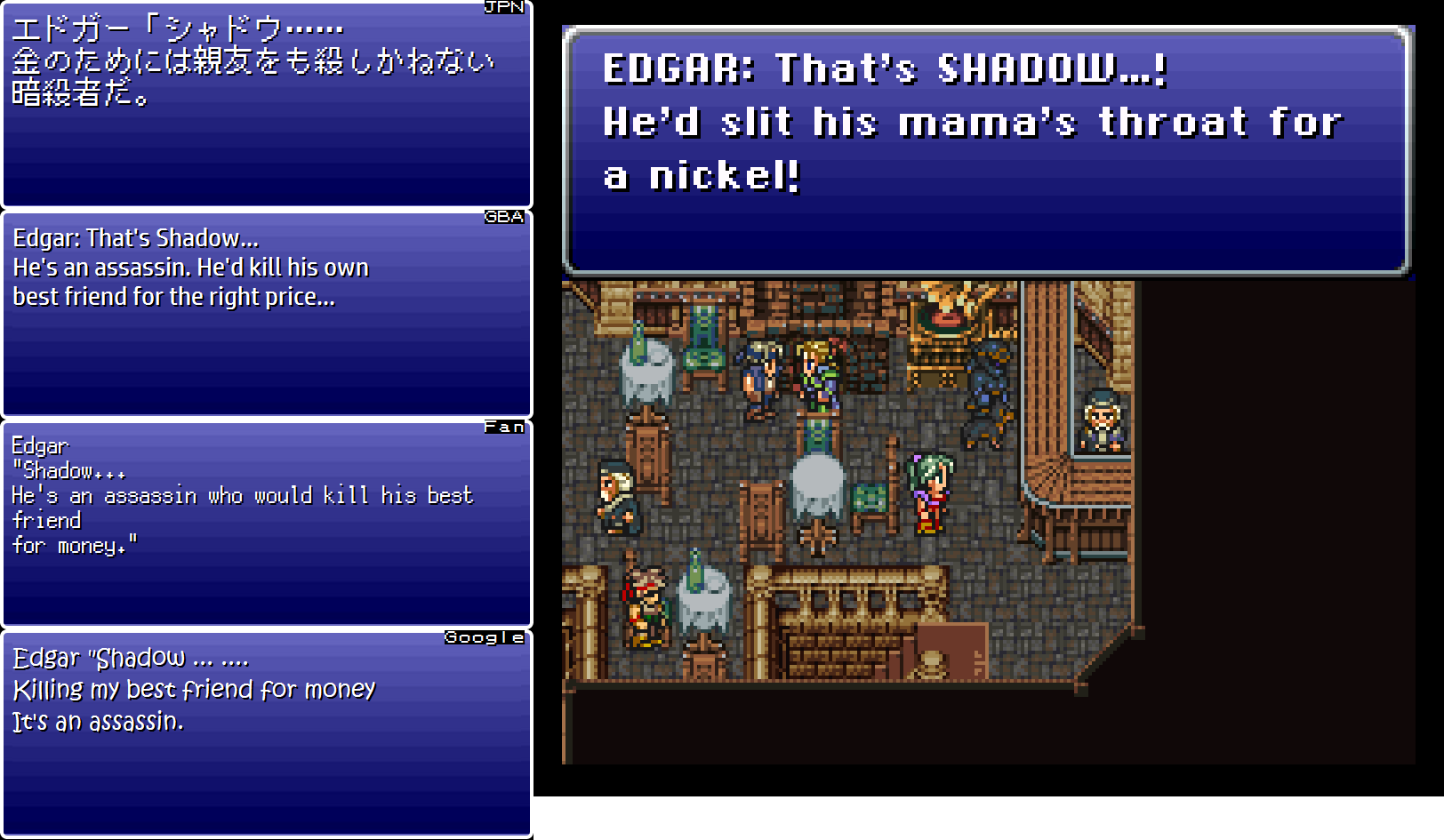
In Japanese, Edgar describes Shadow by saying, “Shadow…… He’s an assassin who might even kill his closest friend for money.”
The Super NES translation changes this quite a bit in what has become a pretty memorable line: “That’s Shadow…! He’d slit his mama’s throat for a nickel!”
Of course, this is a surprisingly violent phrase – how did Nintendo of America approve it, I wonder. This change also implies that nickels now exist in the world of Final Fantasy VI.
Who Spiked the Cider?
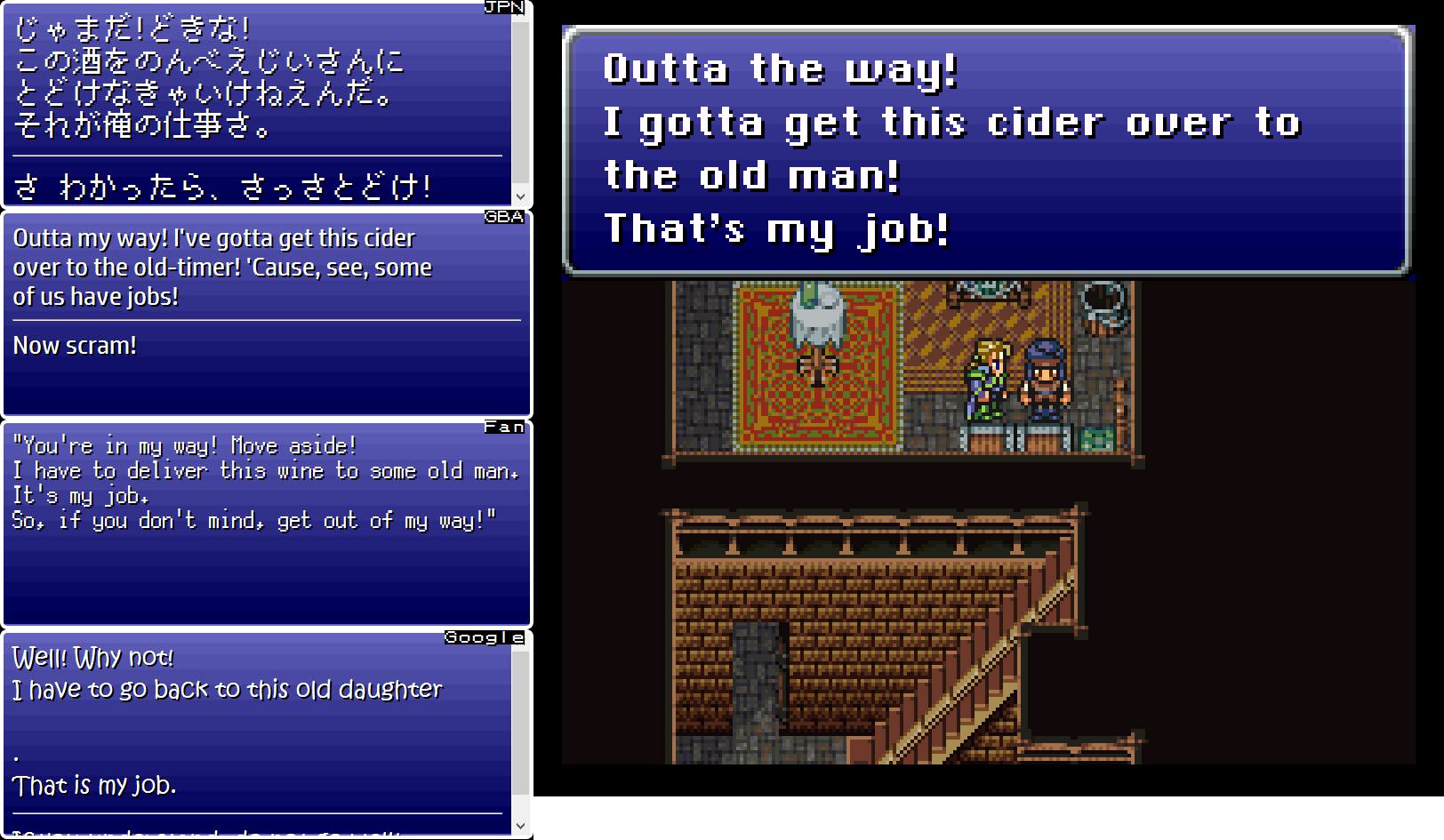
The mention of generic alcohol in the Japanese version was replaced with cider in the Super NES translation. This was a pretty memorable change, so the GBA translation retains the idea that this old man loves cider.
Nice Save, Kid
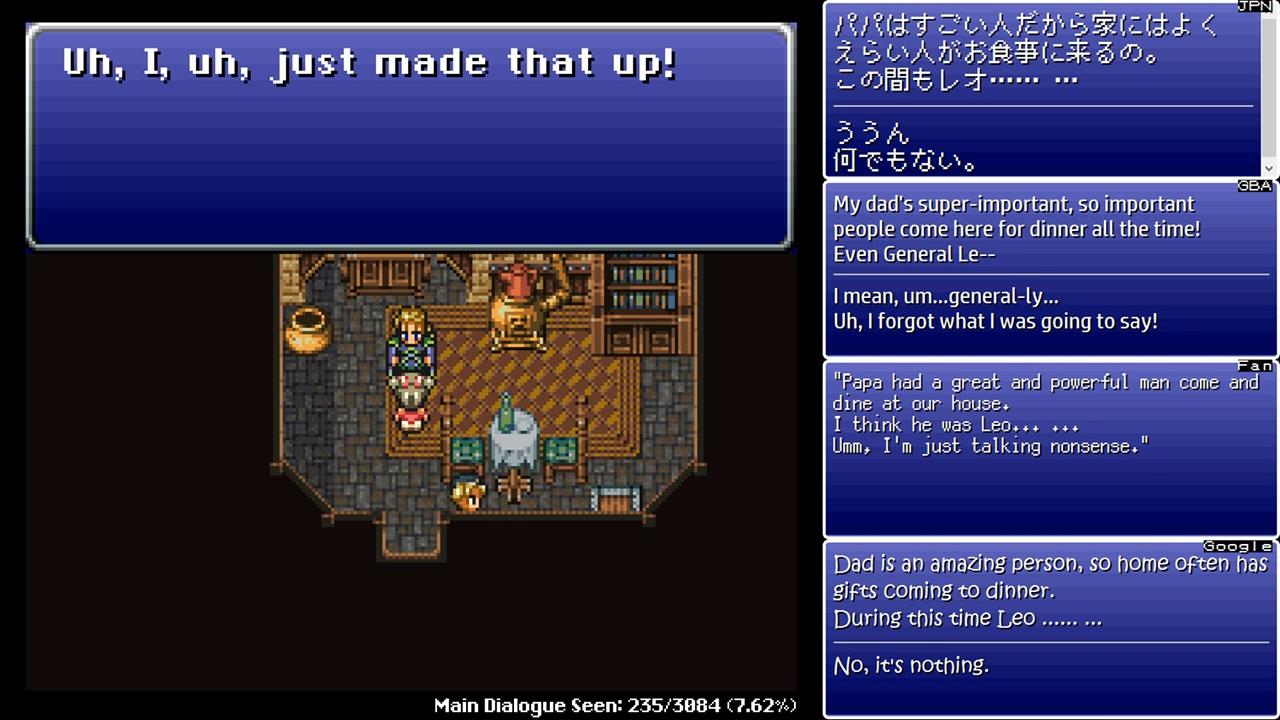
This girl accidentally blurts out a secret, so she says, “Oh, uhh, never mind.” in Japanese afterward. The GBA translator noticed that the secret involved a mention of General Leo, and then had the clever idea to use the word “generally” as part of her “actually never mind” statement.
Real Money Enters Fantasy
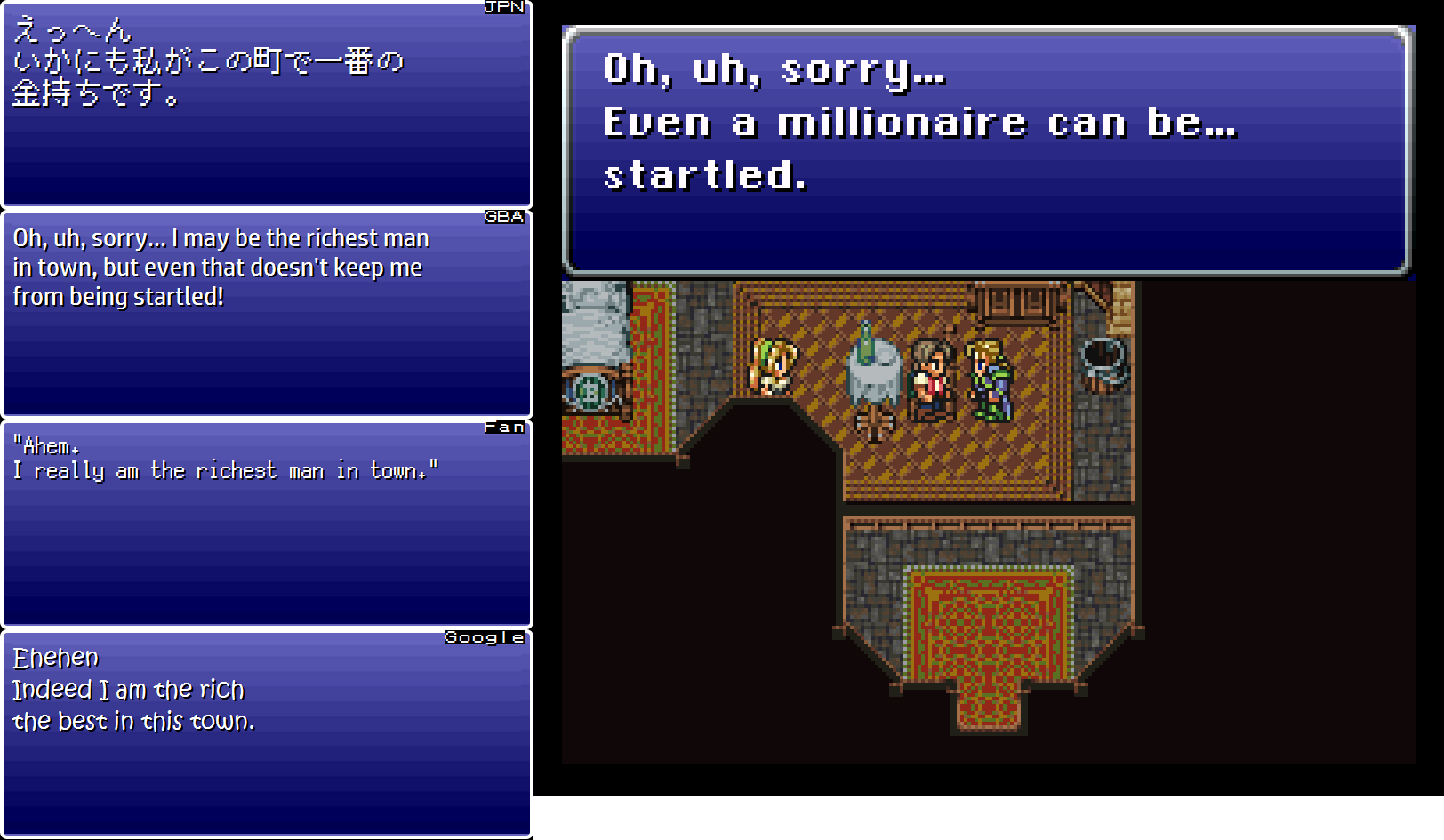
In the Japanese line here, the man says that he is “the richest man in town”.
In America, the word “millionaire” is pretty much synonymous with being filthy rich – even more so when this game was first released – which is why this character uses the word in the Super NES translation.
But having a million units of currency doesn’t mean the same everywhere: a million yen in Japan is only like $9000 USD, for example. Plus, decades after the Super NES translation’s release, it somehow feels like “billioniare” is the new “millioniare” anyway. These are probably just a few of the reasons might explain why “millionaire” was reverted back to “richest man” in the GBA translation.
In all, this is a good example of how even numbers can have different underlying meanings between languages and cultures.
Get That Greek God Out of Here
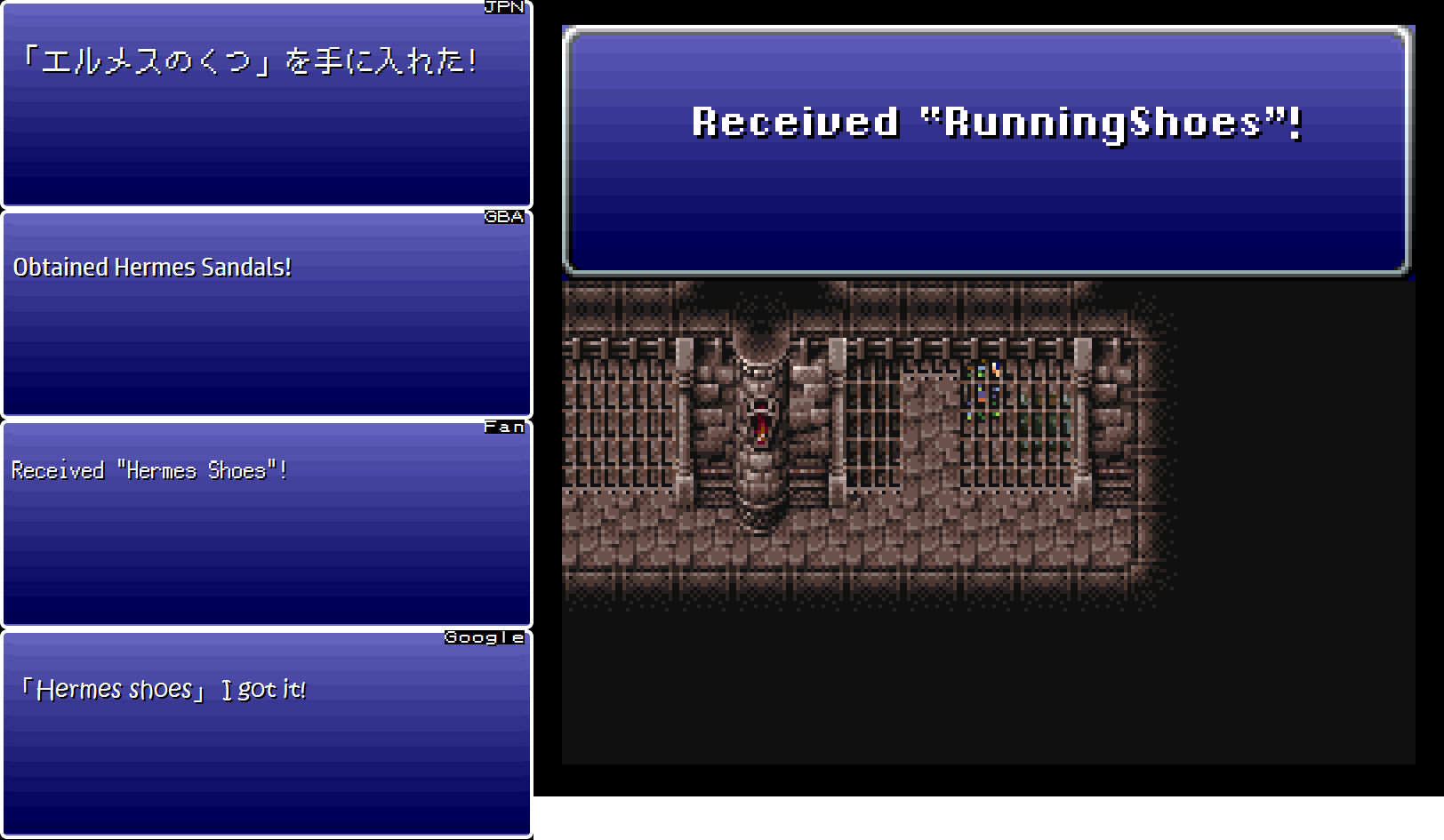
This item is called the “Hermes Sandals” or “Hermes Shoes” in Japanese. I’ve actually researched and written about Nintendo of America’s content policies in the 1990s, and while the policies prohibited the use of religious references, references to ancient Greek and Roman mythology were specifically given the OK. So it’s surprising to see Hermes removed here. Maybe someone thought the North American target audience wouldn’t recognize the “Hermes” name?
The replacement name of “RunningShoes” is so similar in concept to the “Sprint Shoes” that I’m sure it temporarily confused plenty of players back in the day.
Pardon My French
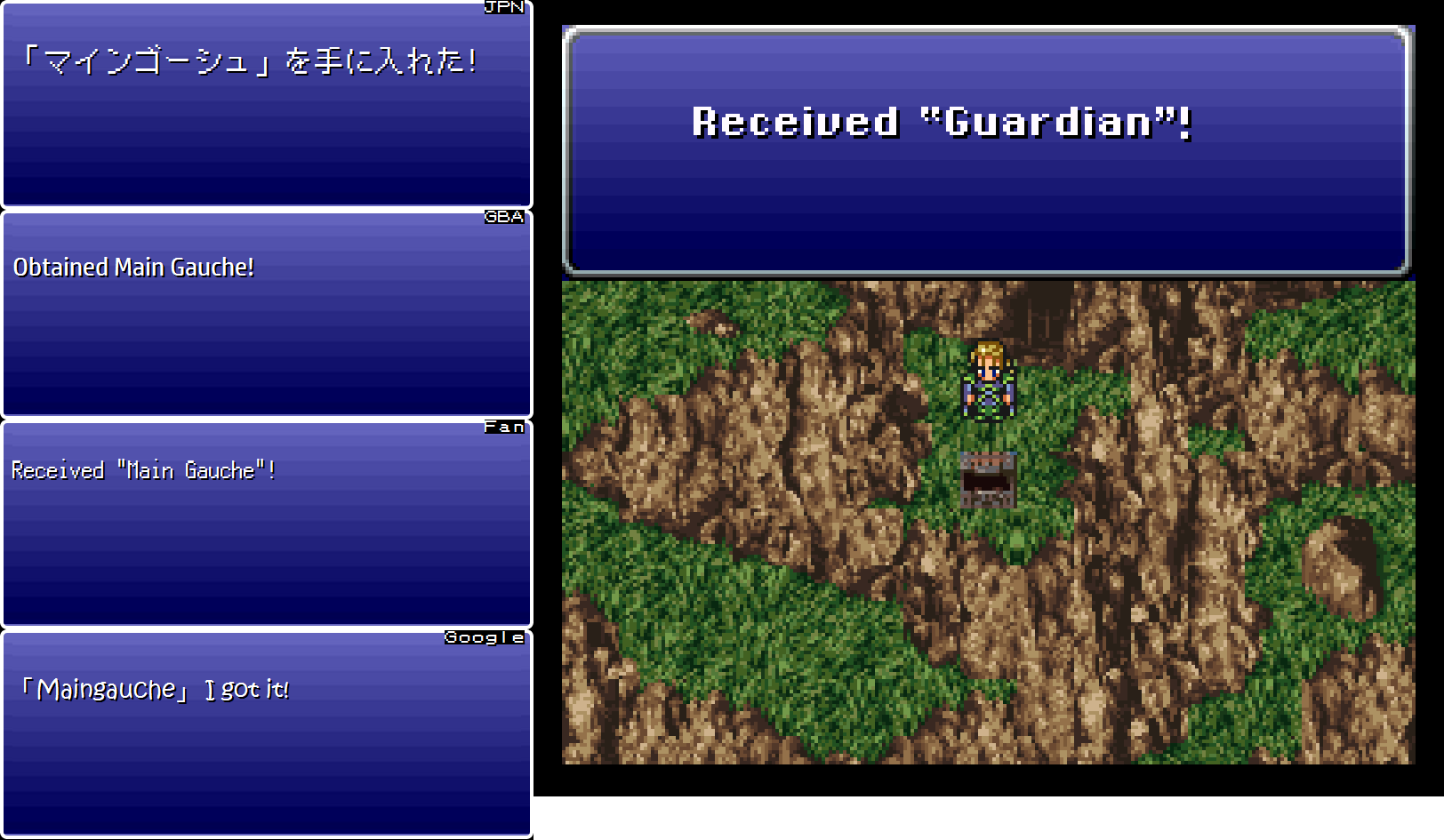
In the Japanese version, this weapon is called the マインゴーシュ (maingōshu). A rushed or inexperienced Japanese-to-English translator with limited research abilities would probably crumple upon seeing this word – it’s not clear what it should be. “Mine Gosh”? “Myngoshu”? What the heck should it be? This, coupled with the fact that the weapon raises defense as well as offense, is likely (but not 100% guaranteed) why the Super NES translation changes the name to “Guardian”.
A non-rushed, more experienced Japanese-to-English translator would probably recognize that マインゴーシュ is so problematic because it isn’t actually supposed to be an English name at all, and that based on the pronunciation, it sounds like it’s probably from a European language of some sort.
The Internet has made research so much easier for translators over the years: one quick search for マインゴーシュ instantly reveals that it’s supposed to be “main gauche”, a French name for a very specific type of dagger used centuries ago. This is why all the other translations – even the reliably wacky machine translation – gets the name perfect here.
Similar to the “Saber Mountain” thing above, this is good example of how Japanese words imported from non-English languages can cause headaches for Japanese-to-English translators.
Be Careful What You Type
As a translator, you don’t always get to see what your text will look like in the final product ahead of time. Sometimes your text can be presented in strange ways outside of your control:
So, over time, you sort of gain a constant awareness of what you’re typing and how it could look or sound in a worst-case scenario. While I don’t think I’ve seen it backfire yet, the word “who’re” has always triggered this alert system for me – one weird font mishap and it could look like “whore” at first glance.
I only bring this up because that instinct got triggered when I saw this line while playing, but I bet writers and editors and proofreaders everywhere gain a similar instinct over time too.
Warrior Style
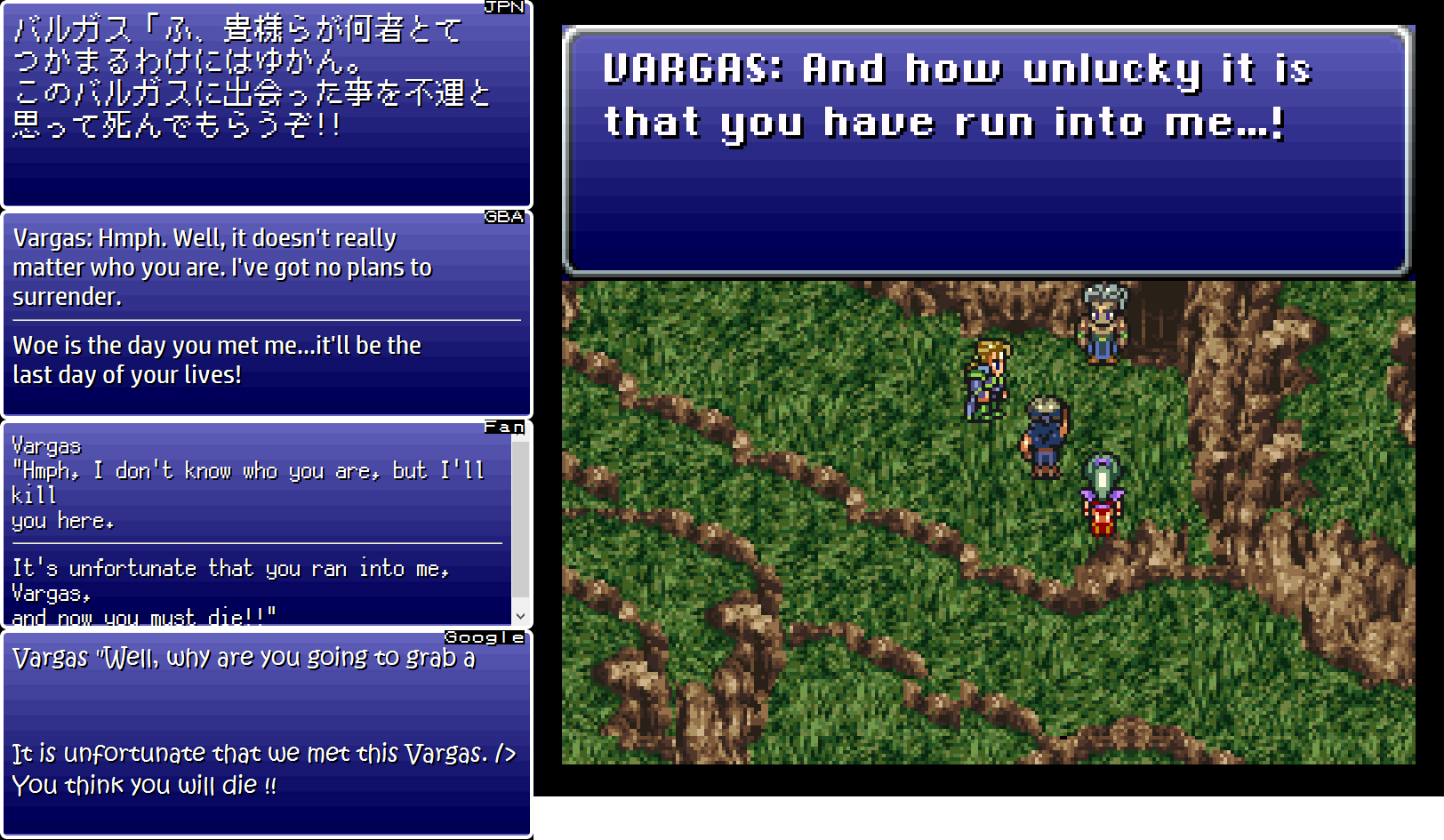
Vargas speaks in a style of Japanese that isn’t used in actual, everyday situations but is relegated mostly to martial artists/warriors in Japanese entertainment. Throughout all the Vargas stuff, the fan translation struggles to fully understand what’s being said and instead seems to be a lot of guesswork.
For example, when Vargas says “I cannot afford to be caught.” in Japanese, he says “I’ll kill you here.” in the fan translation.
On the other hand, the Super NES translation actually leaves out the entire first sentence of Vargas’ line here. Only the GBA translation gets it complete and correct.
Special Attacks
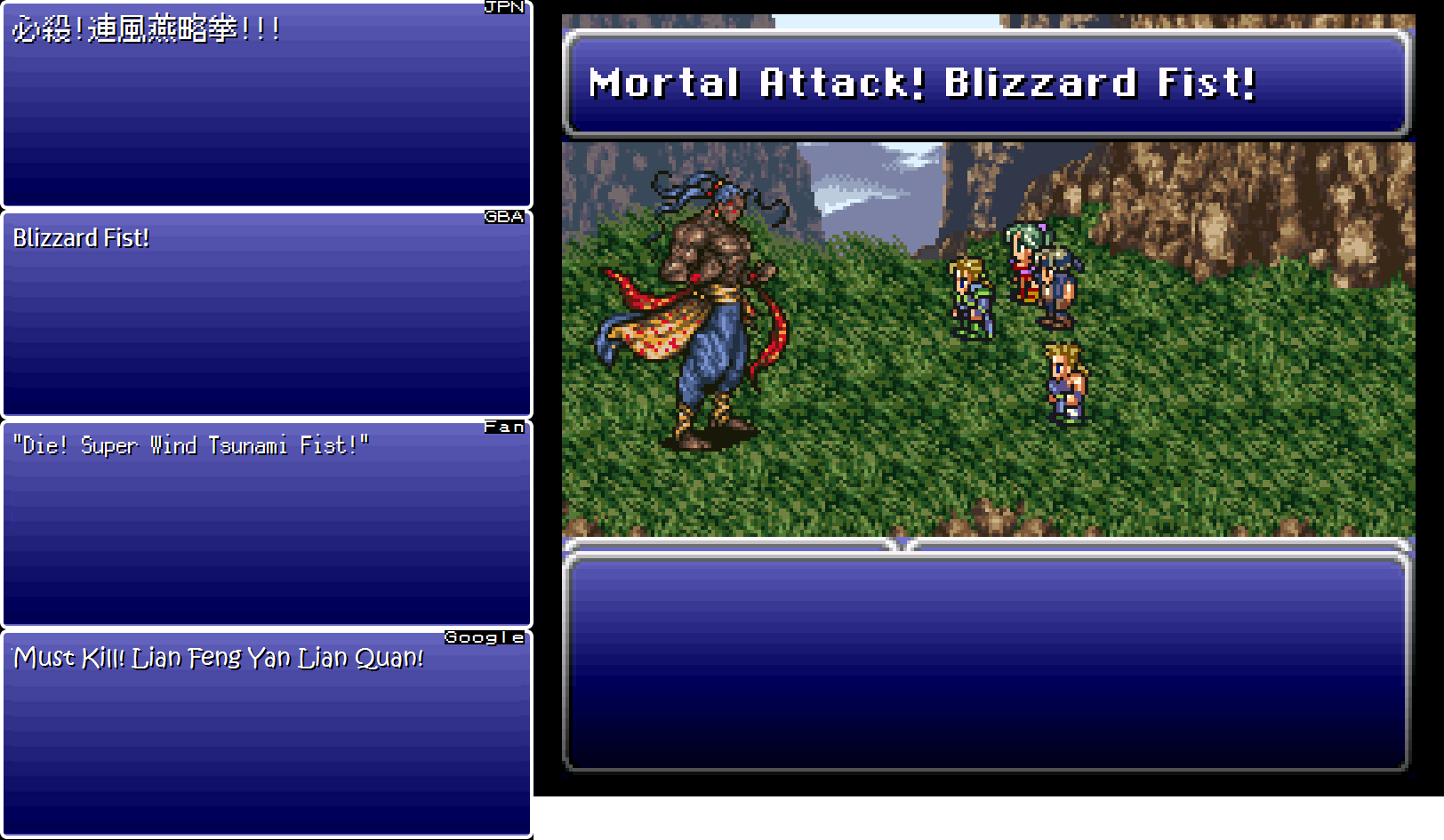
Vargas uses a special attack here. In Japanese, he starts out by shouting 必殺 (hissatsu).
This hissatsu phrase literally translates into something like “certain kill”, but functionally it’s used in the sense of “special attack”. In Japanese entertainment, hissatsu is commonly shouted before someone does some sort of better-than-normal attack.
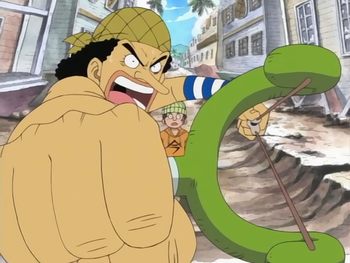
The actual attack name in Japanese is pretty long and complicated, as is normal for fancy, made-up attack names in Japanese entertainment. It’s made entirely of kanji, which are the fancy, complicated-looking characters that originally come from the Chinese language. This is why the Google translation gets confused and starts trying to translate the name into a Chinese name.
There are lots of different ways to interpret the attack name, which is 連風燕略拳 (renfūenryakuken). Trying to translate made-up names like this is a fool’s errand – each individual character can have multiple meanings by itself, so when you combine them it makes pinning things down even harder. Even so, one possible translation might be “linked wind swallow (as in the bird) capture fist”.
So how do you handle made-up, kanji-only names like this? There are two common solutions: leave them untranslated, like Ryu’s “tatsumaki senpūkyaku” in Street Fighter, or come up with a new, simpler name in English that sort of fits the same vibe as the original name or fits whatever the attack looks like.
Anyway, in this scene in Final Fantasy VI, the Super NES translation goes with “Blizzard Fist”, based on what the attack sort of looks like in action. The GBA version follows suit, while the fan translation goes with “Super Wind Tsunami Fist”.
With things like this, there’s usually no “correct” translation. It’s another one of those weird, lesser-known challenges that game/entertainment translators run into every day.
Oh, Google…
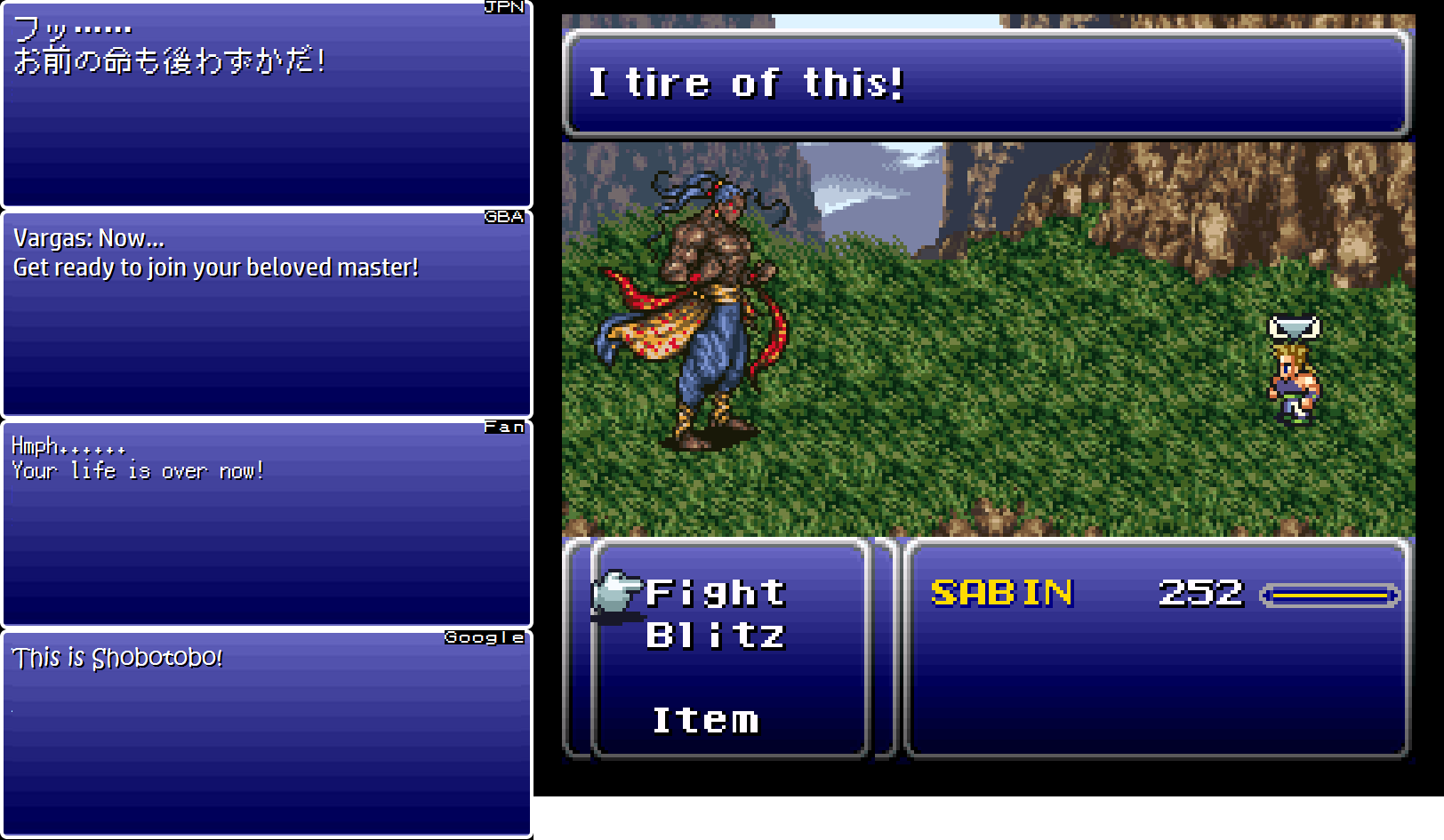
I… have no idea how Google Translate reached its translation here. I’m in awe.
The Knockout Blitz
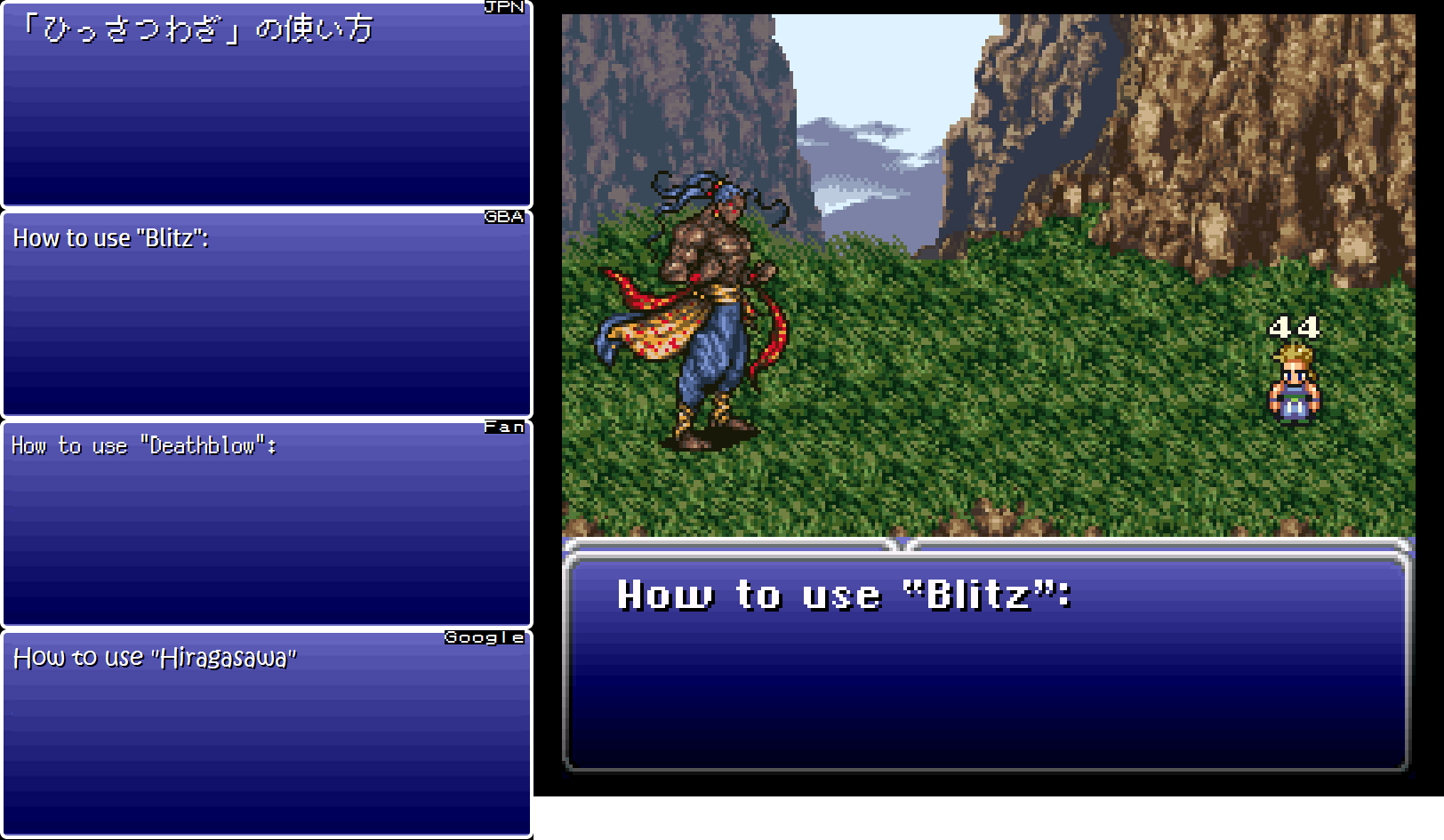
Sabin’s special “Blitz” ability is called ひっさつわざ (hissatsu waza) in Japanese. It literally means “certain kill technique”, but much like the word hissatsu that we just looked at, it functionally refers to what we’d call a “special move” in English. You hear it all the time in games, anime, martial arts movies, pro wrestling, and stuff like that. Other common translations for hissatsu waza that come to mind include “special technique”, “finisher”, and “knockout hit”.
This hissatsu waza word gets translated in many different ways in games, here are a couple examples I recall offhand:
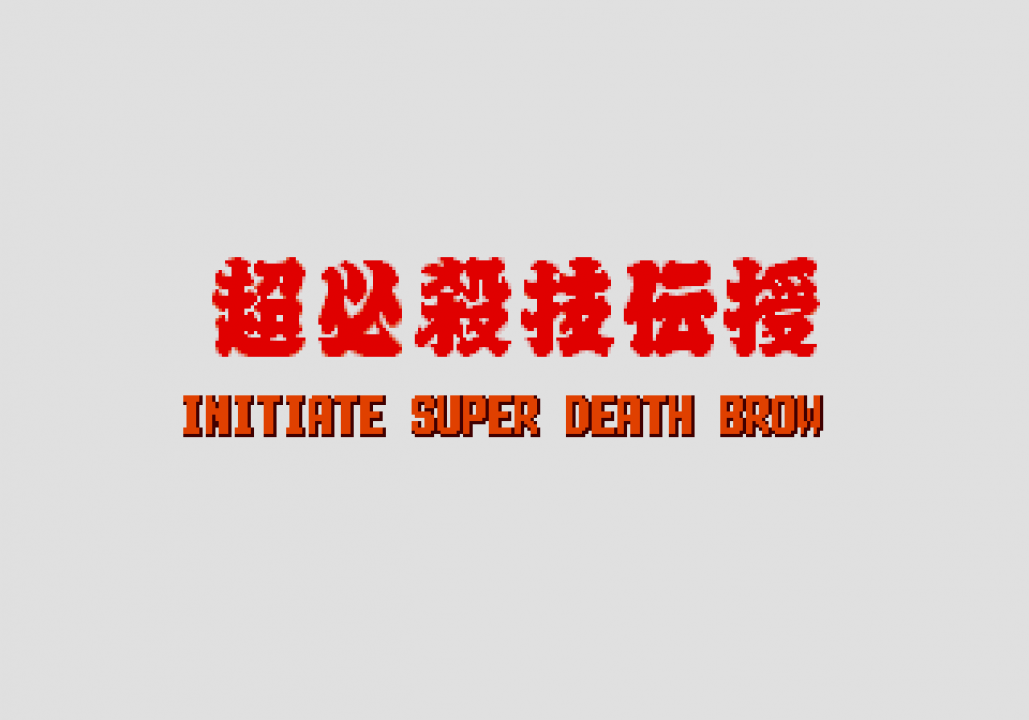
Start Cleaning
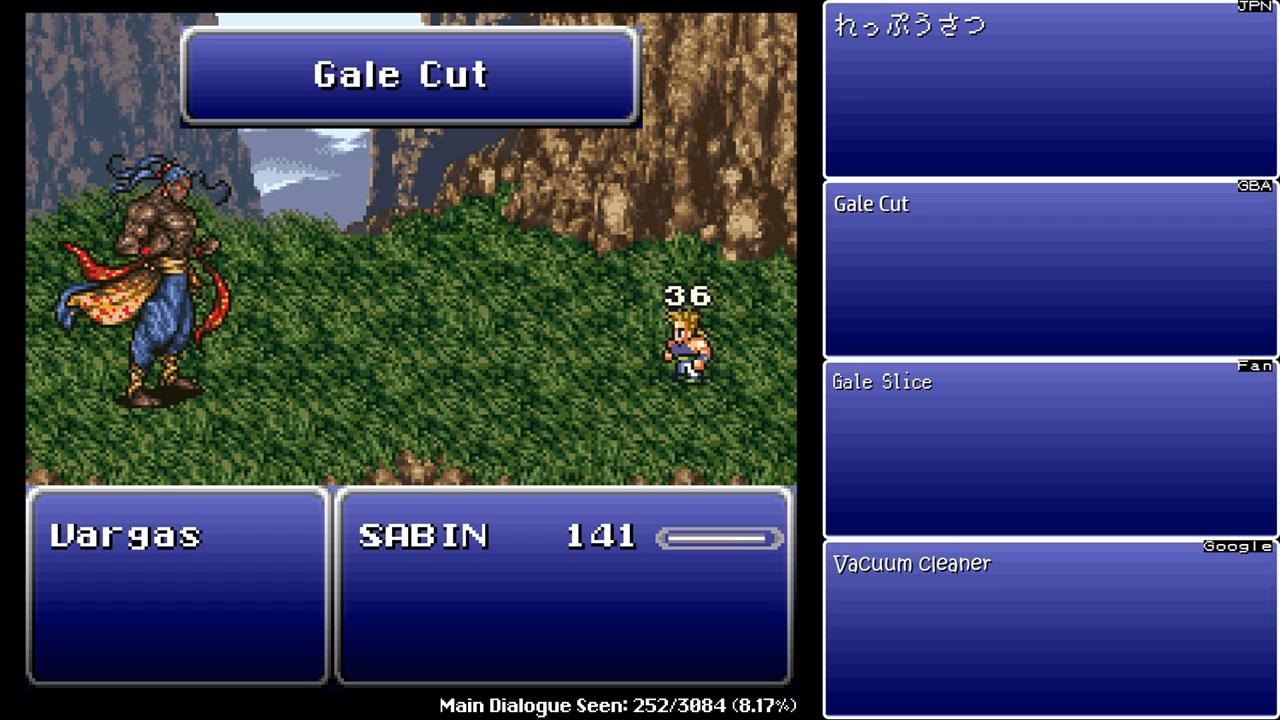
Vargas uses a technique with a Japanese name that means something like “Intense Wind Kill”. Most of the translations use “Gale Cut” or “Gale Slice” instead, but Google turns it into the delightful “Vacuum Cleaner” attack.
There’s a Bear in the Gym
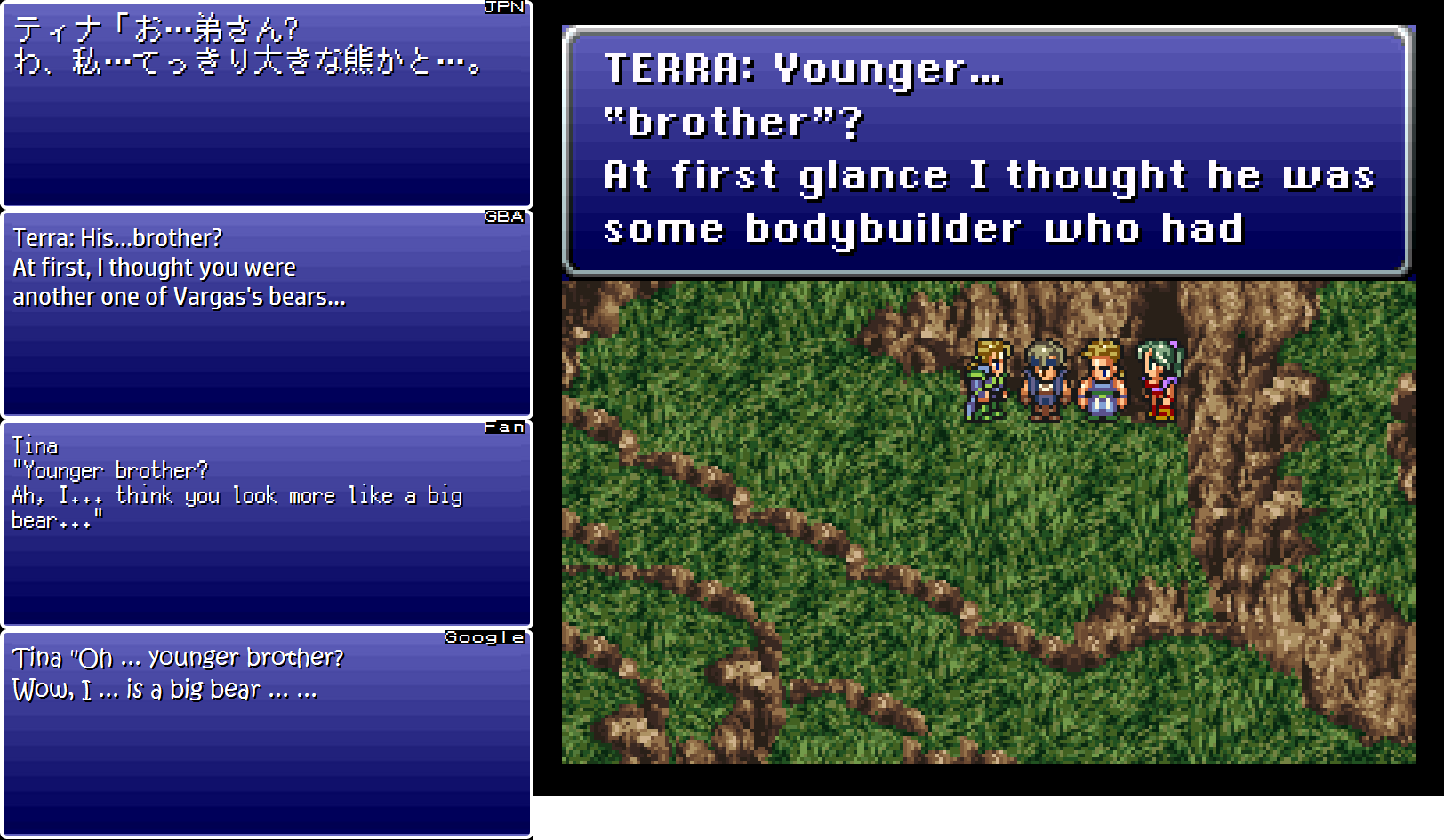
In the Super NES translation, Terra says she thought Sabin “was some bodybuilder who had strayed from a gym”.
The original Japanese line is quite different: “I- I thought he was a giant bear, actually…” We can see that all the other translations keep this “bear” thing intact.
This change in the Super NES script implies that bodybuilding is a thing in the world of Final Fantasy VI, as are gyms. My first impression during the stream was that this line feels vaguely similar to the kind of changes found in old Working Designs localizations, but not quite as world-breaking/fourth wall-breaking.
Dogged Guesswork
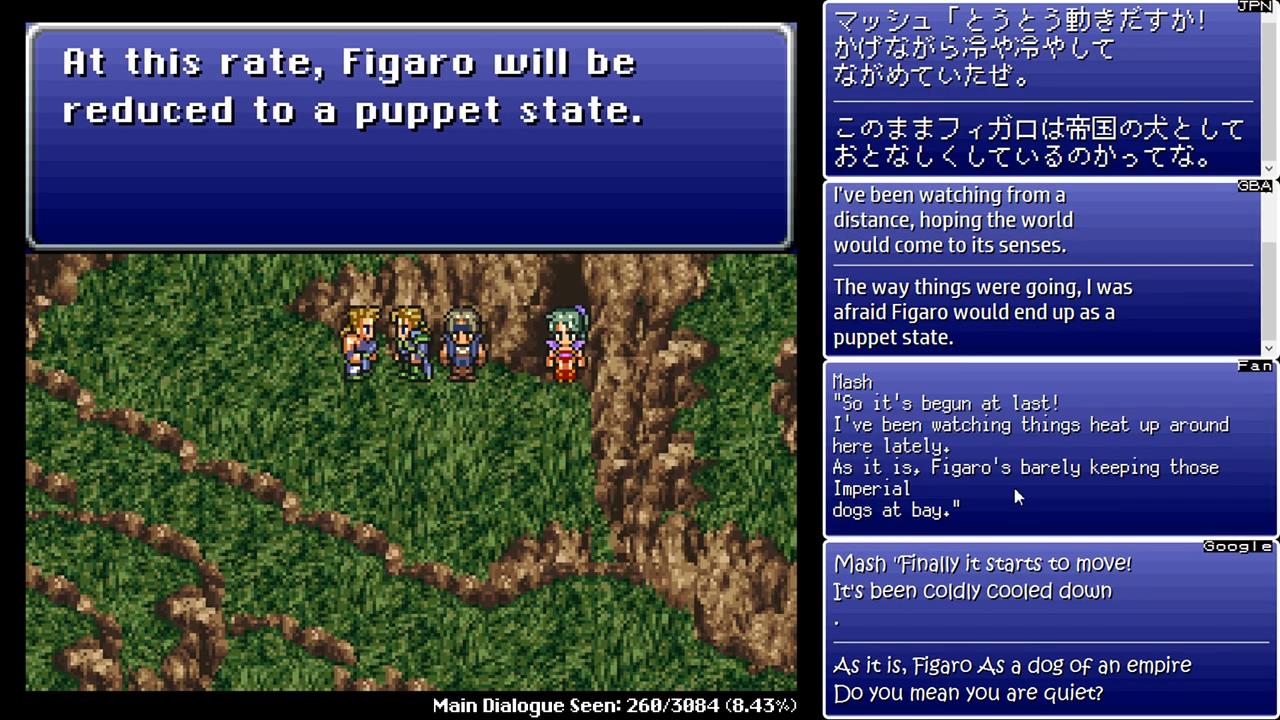
The Japanese line here talks about Figaro behaving like the Empire’s dog. The Super NES and GBA translations rephrase this by using “puppet state”. The fan translator seemed to have difficulty grasping the grammar but did understand the word “dog” in the sentence. The resulting text appears to be incorrect guesswork that involves the word “dog”.
Bear-ly a Callback
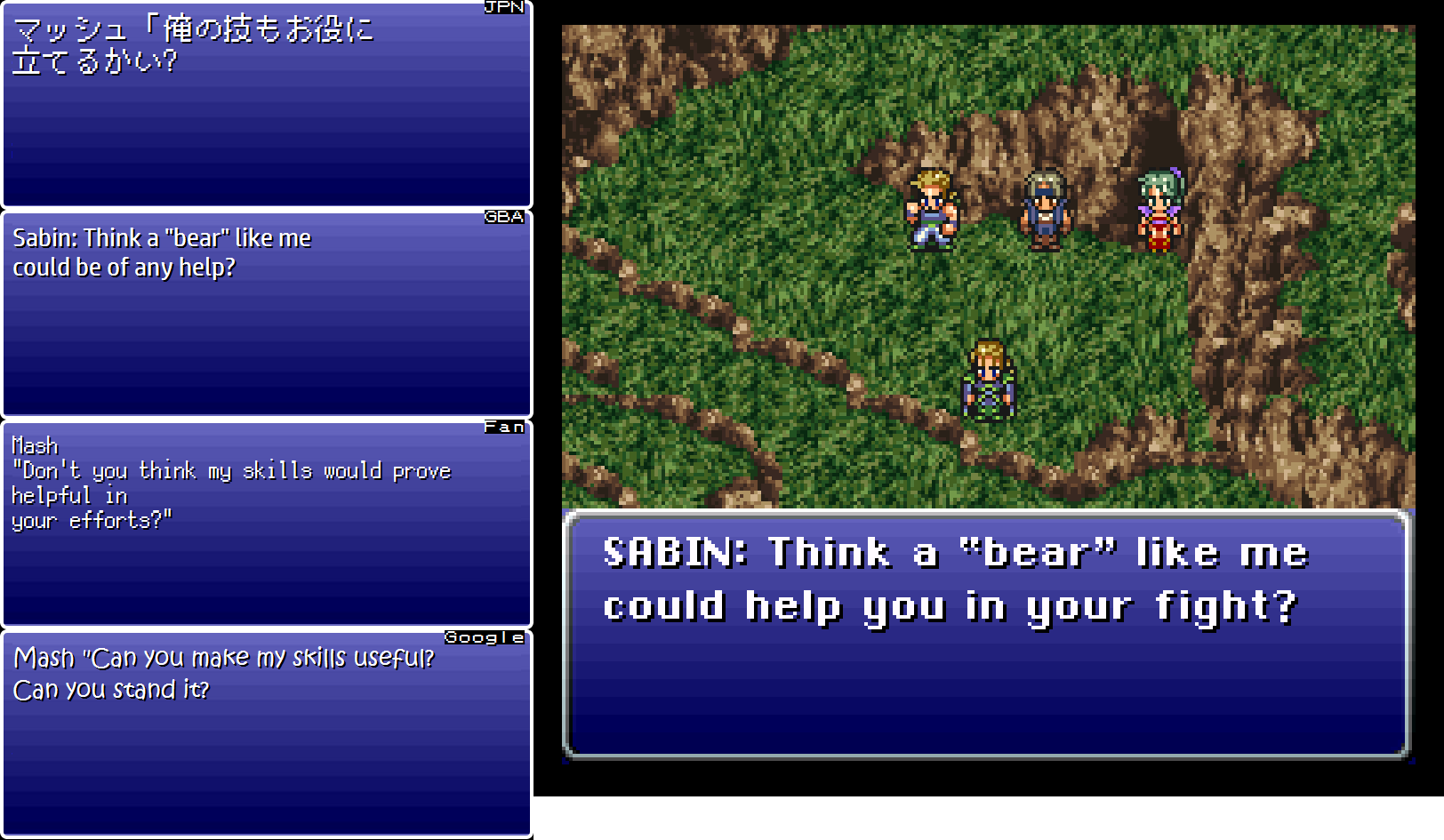
As we’ve seen, Sabin has been compared to a bear in the Japanese version of this scene, but a “bodybuilder who strayed from his gym” in the Super NES translation.
In this later line, Sabin does a callback to the earlier “bear” references, so you would expect the Super NES translation to reference the “bodybuilder” thing again too. Strangely, it instead starts calling him a “bear” here. This was a surprising inconsistency I didn’t expect to find.
Bannon Ganned
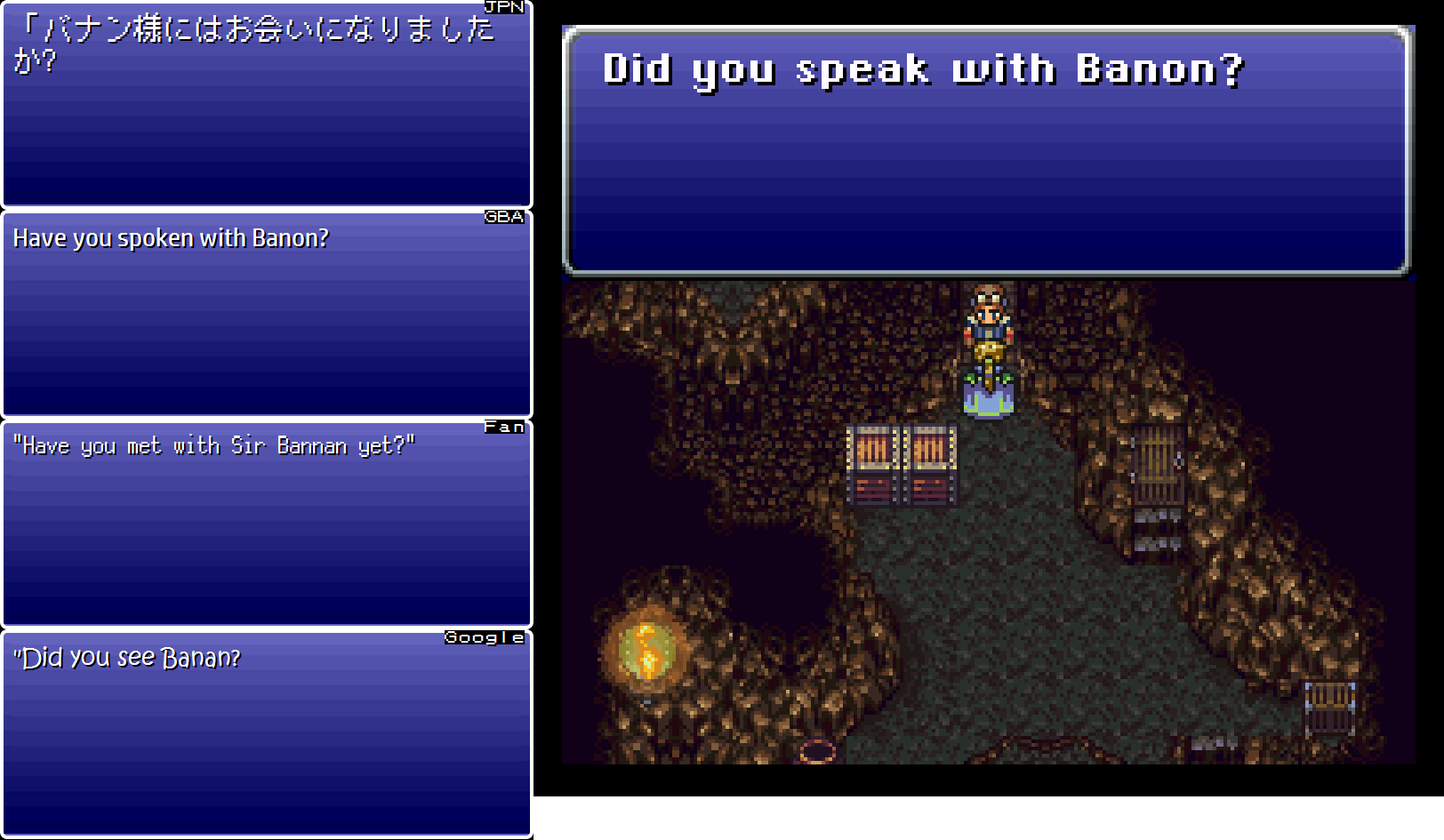
The head of the Returners organization is named バナン (banan) in Japanese. In the Super NES and GBA translations he’s called “Banon”, while in the fan translation he’s “Bannan”.
I’m not sure why “Banon” was chosen over “Banan” – maybe it was just an aesthetic change. I’m also not sure why the fan translation uses “Bannan” instead of “Banan” – there would be a clear difference between the two spellings in Japanese. So this is another instance in which I assume the “Bannan” spelling probably appeared in some sort of Japanese merchandise, strategy guide, or other secondary Japanese material.
Don’t Speak
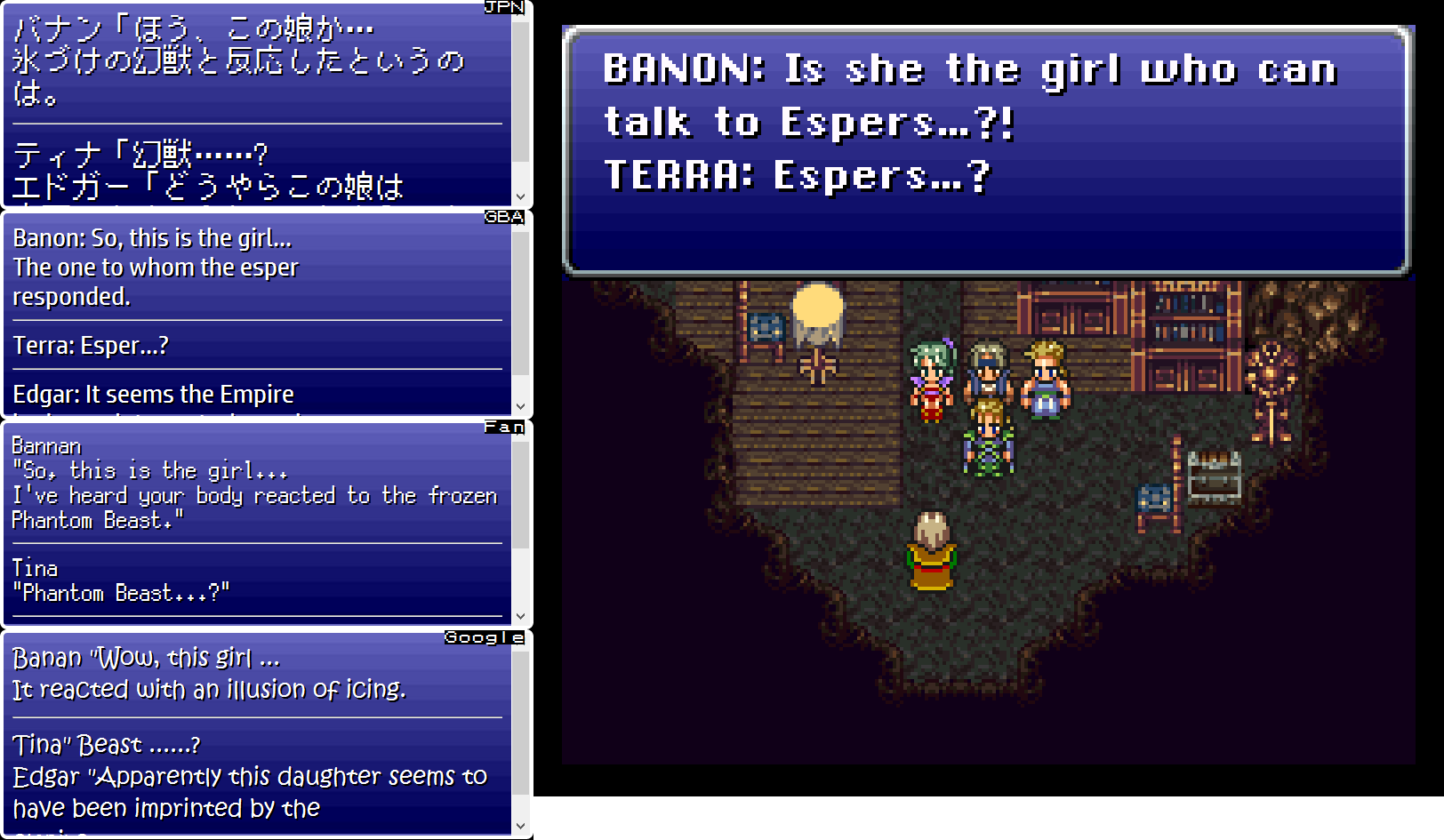
During this entire section of the game, the Super NES translation continually mentions that Terra is able to “talk to Espers”. In actuality, though, she never spoke to the Esper at the beginning of the game – she and the frozen Esper had simply reacted to each other.
The GBA translation fixes this misunderstanding, as does the fan translation.
Cut Down on Punctuation!!!!!!!!
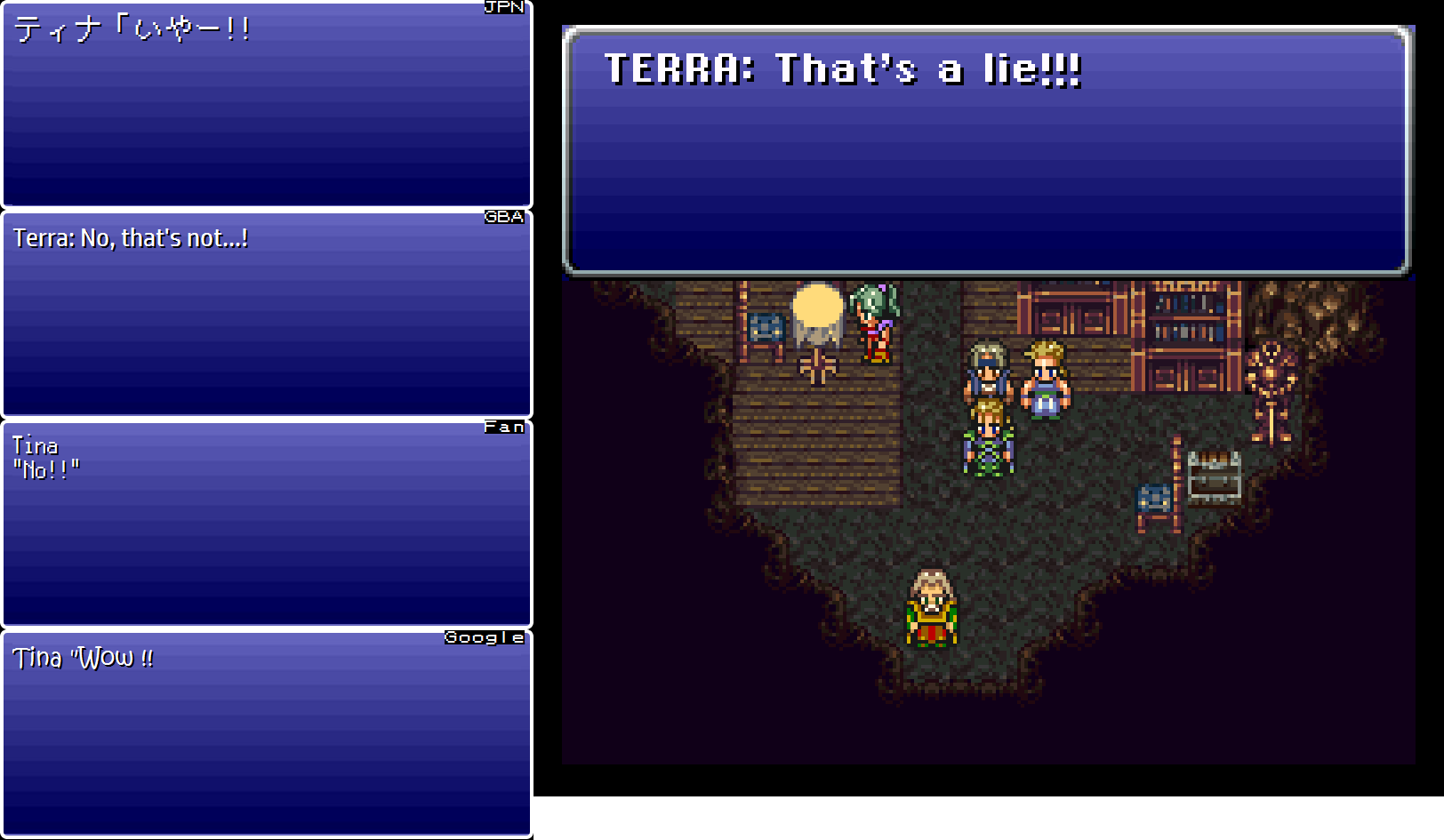
We briefly looked at how ellipses get handled in different ways in different translations and how modern translations tend to cut down all the excess ellipses. The same is generally true with exclamation marks too.
In this instance, it’s interesting to see that the Super NES translation adds an exclamation mark, the GBA translation removes one (while adding an ellipsis), and the fan and machine translations keep the same number of exclamation marks.
Don’t Run From the Truth
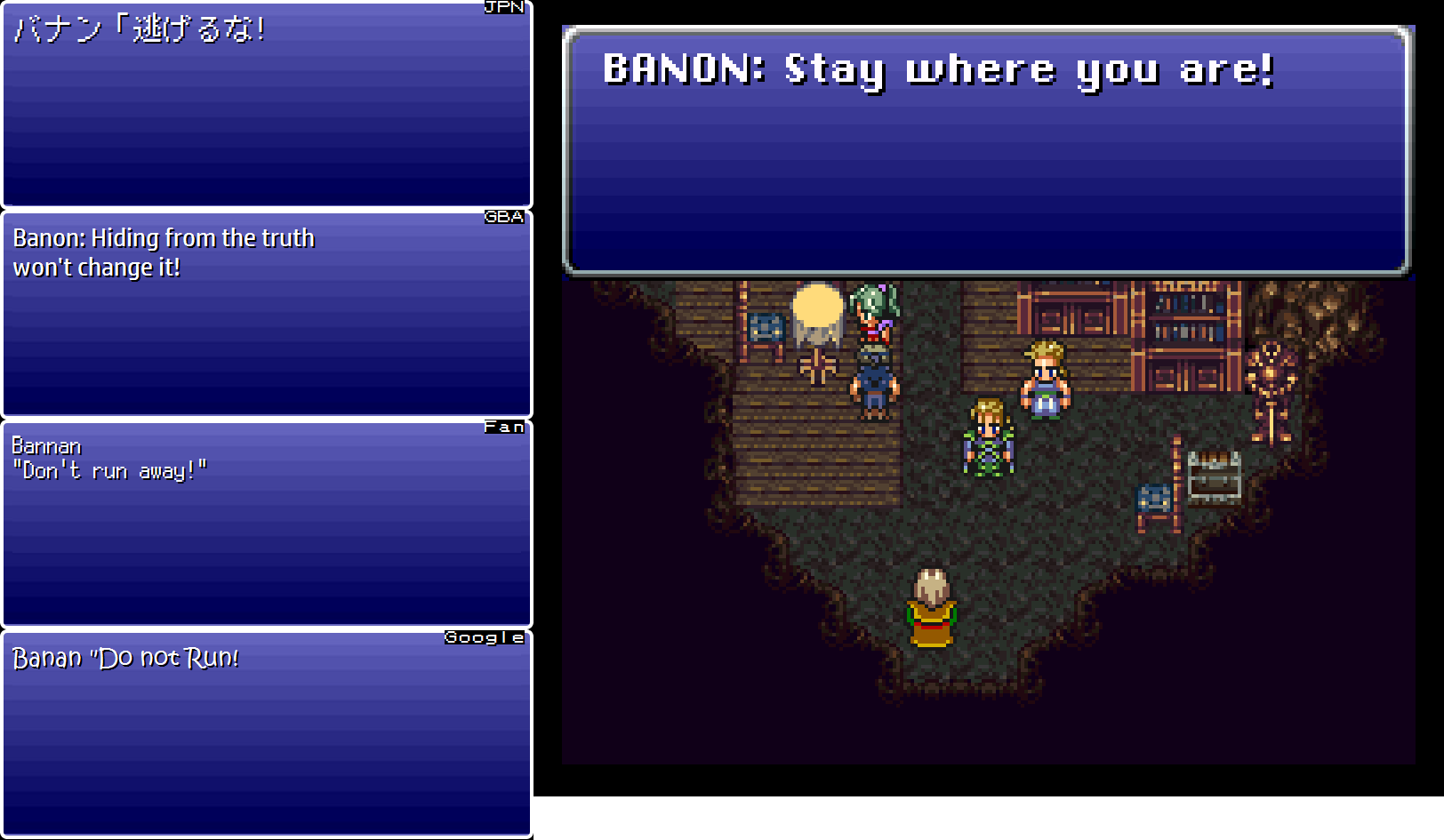
In Japanese, the word 逃げる (nigeru) usually means “to escape” or “to run away”. This is why Banon suddenly shouts “Stay where you are!” in the Super NES translation. But it’s a weird line – Terra’s not actually trying to go anywhere. So what’s the deal?
In some situations, like when discussing personal problems as Terra is here, 逃げる means “to run away” in the “avoiding your problems” sense. And that’s precisely what Banon is saying here: “Don’t avoid the issue/your problem!”
So the Super NES line is a mistranslation here. It possibly came about because the line normally would mean “don’t run away” in most other contexts and you don’t always have context when translating on a tight schedule. We can see the fan translation and Google translation fail to read the situation fully in a similar way, however. Only the GBA translator fully recognizes this contextual use of 逃げる.
Five Deadly Sins
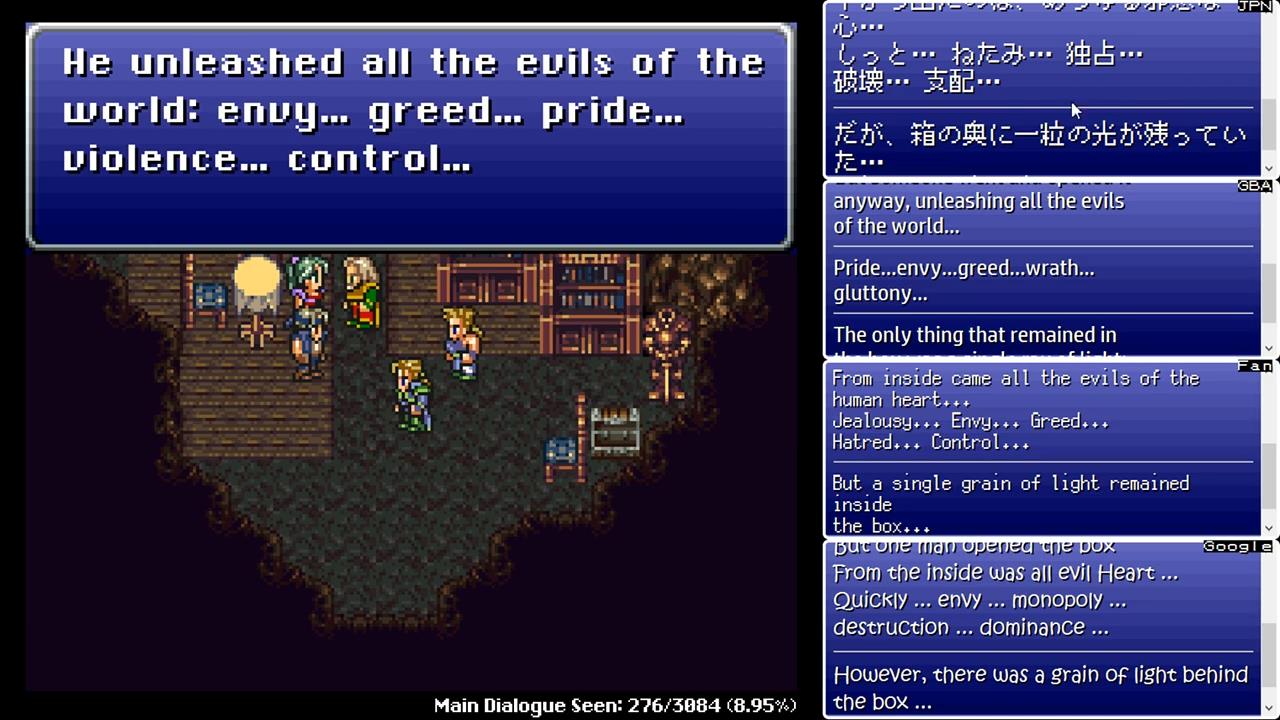
Banon tells a story about a box full of the world’s evils. He lists a bunch of evil things that sprung out of the box when opened. In Japanese the list is something like: envy, jealousy, monopolization, ruin, and domination.
These sound kind of weird in a straight translation, so the Super NES version goes with: envy, greed, pride, violence, and control. These are actually kind of close to the original Japanese words but changed enough to sound less awkward.
The GBA translation changes things even more into what sound like sins from the Bible: pride, envy, greed, wrath, and gluttony.
The fan translation goes with its own take: jealousy, envy, greed, hatred, control.
The machine translation is close to the original Japanese text, but mistranslates the first word, しっと (shitto), as an adverb. It’s kind of an understandable mistake if you’re familiar with how Japanese adverbs work.
Taken
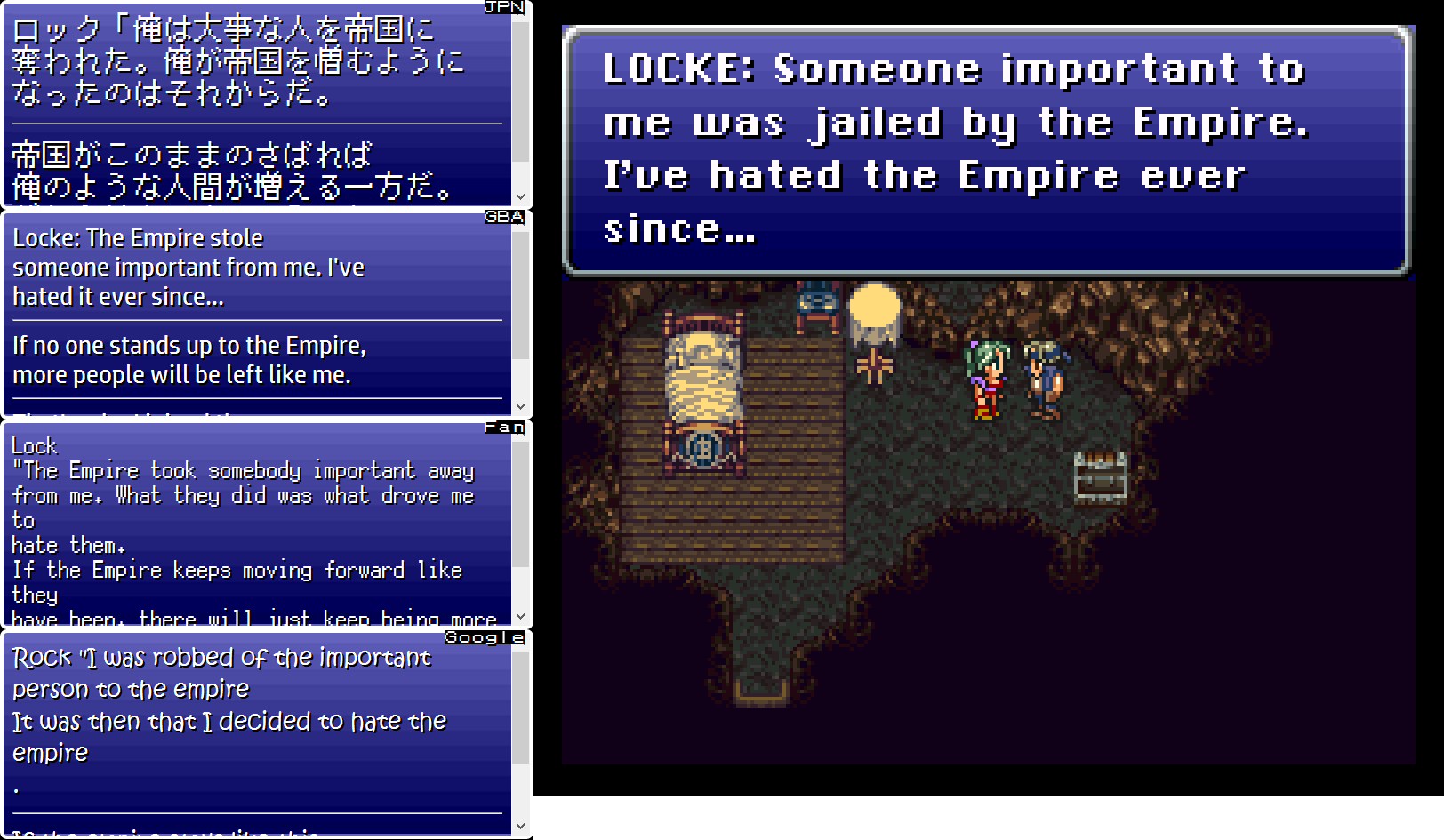
In Japanese, Locke says that the Empire “took away someone important” from him. The Super NES translator misinterprets this “took away” as in literally taking someone away, resulting in “Someone important to me was jailed by the Empire.” Up until now, Locke’s been a pretty happy-go-lucky sort of guy, but this is the first peek we get at his painful background. So it’s a shame that that background info gets messed up a bit here.
The GBA translation, the fan translation, and the machine translation all handle this “took away” phrase properly by leaving the actual meaning ambiguous. We learn later on that this “took away” means that the Empire led to this important person’s death.
An Arrestingly Harsh Tactic
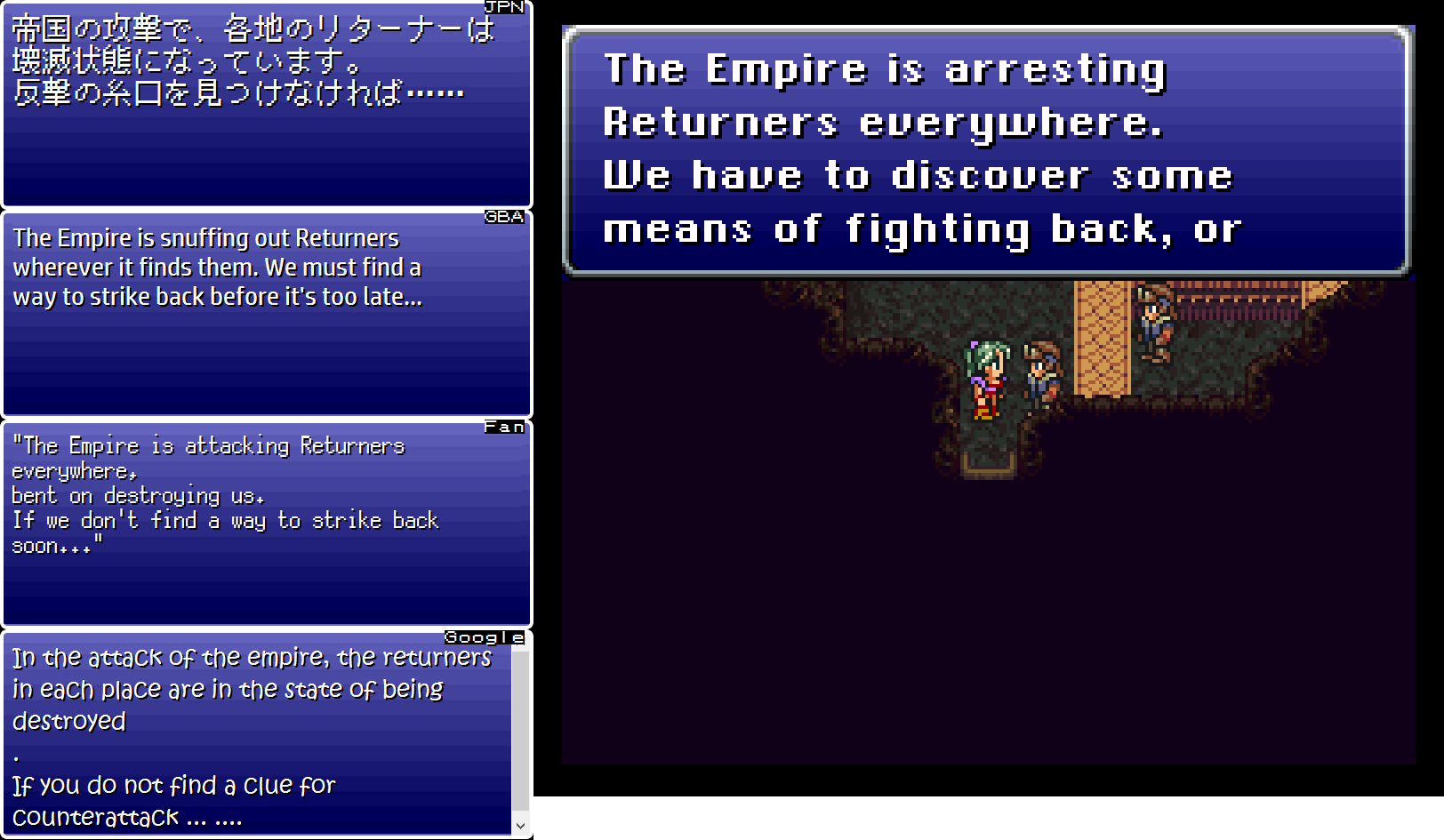
This Returner says that the Empire is “arresting Returners everywhere” in the Super NES translation. The Japanese line actually says that the Empire’s assaults have Returners everywhere on the brink of ruin, which implies that people aren’t getting arrested – they’re getting killed.
The GBA translation fixes this by using the phrase “snuffing out”, and the fan translation gets the line slightly wrong. The Google translation is surprisingly readable and understandable.
Adding to the Story
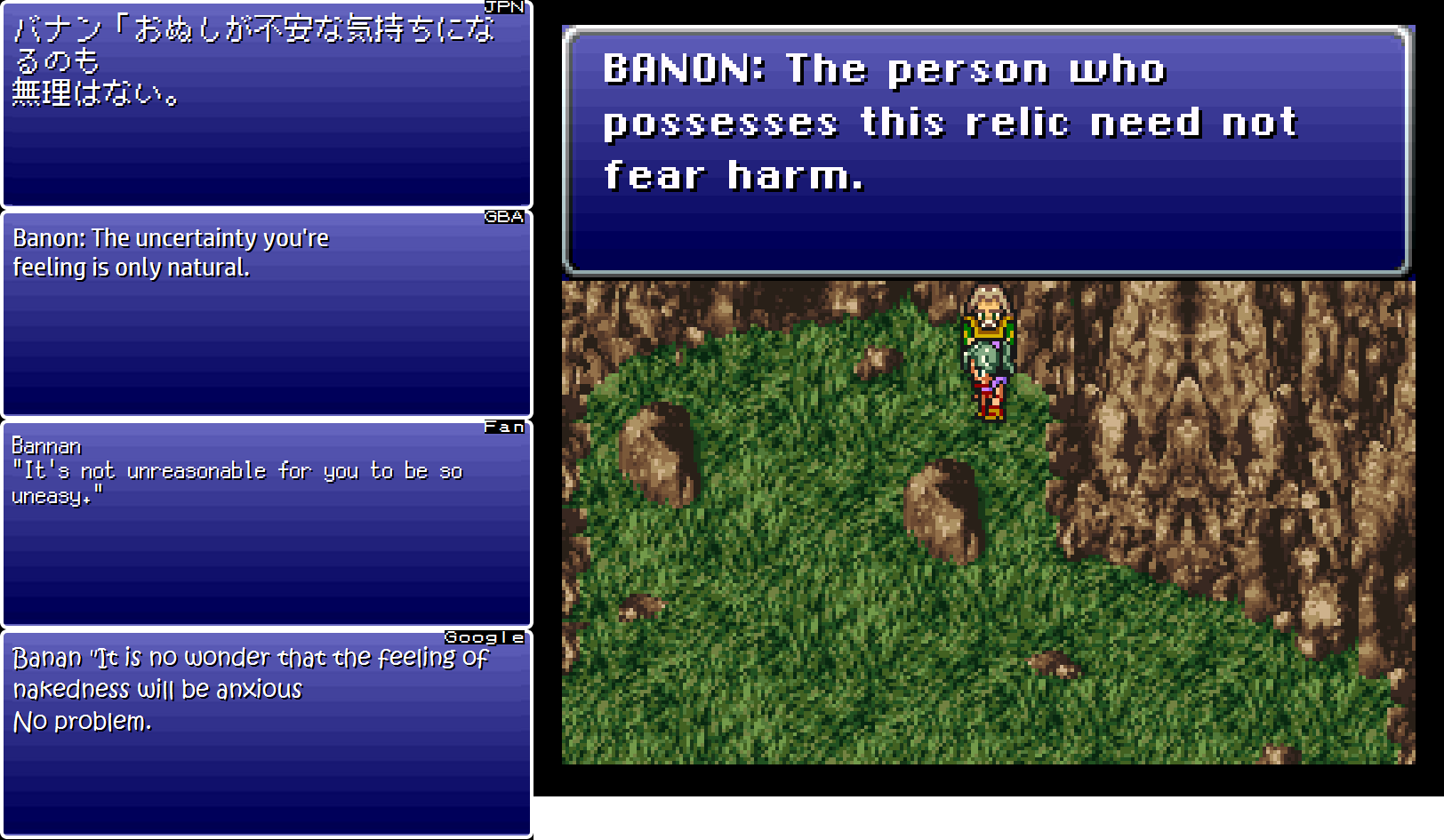
Banon offers Terra an accessory/relic at one point. In the Super NES translation, a window of text was replaced with all-new text that says, “The person who possesses this relic need not fear harm.”
Winners Don’t Litter!
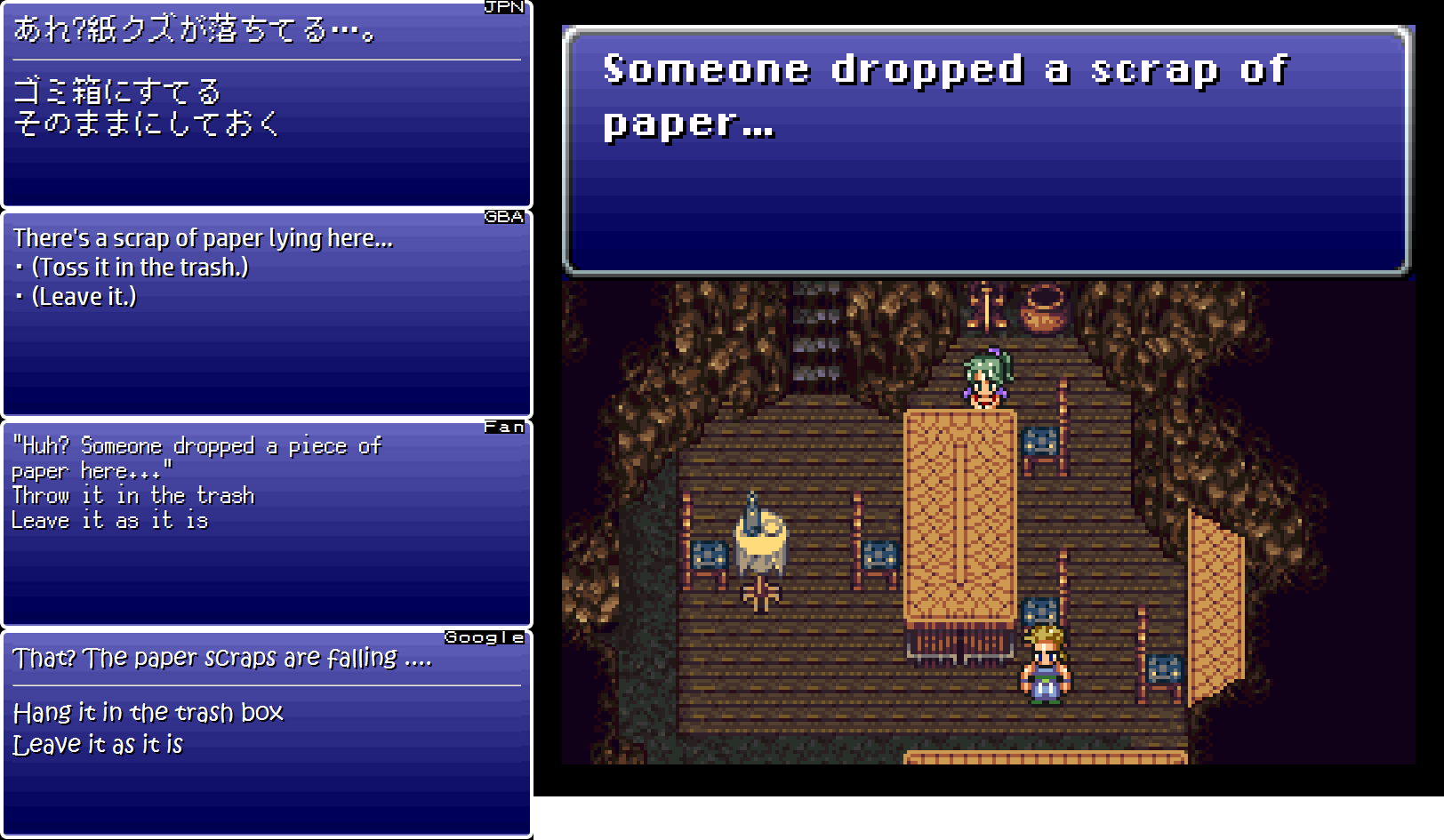
There’s a semi-secret bit of text during this part of the game involving a piece of scrap paper. I’ve already written a dedicated article about it here if you’ve never seen it or are curious how it’s handled in multiple translations.
”Majick” Backfired
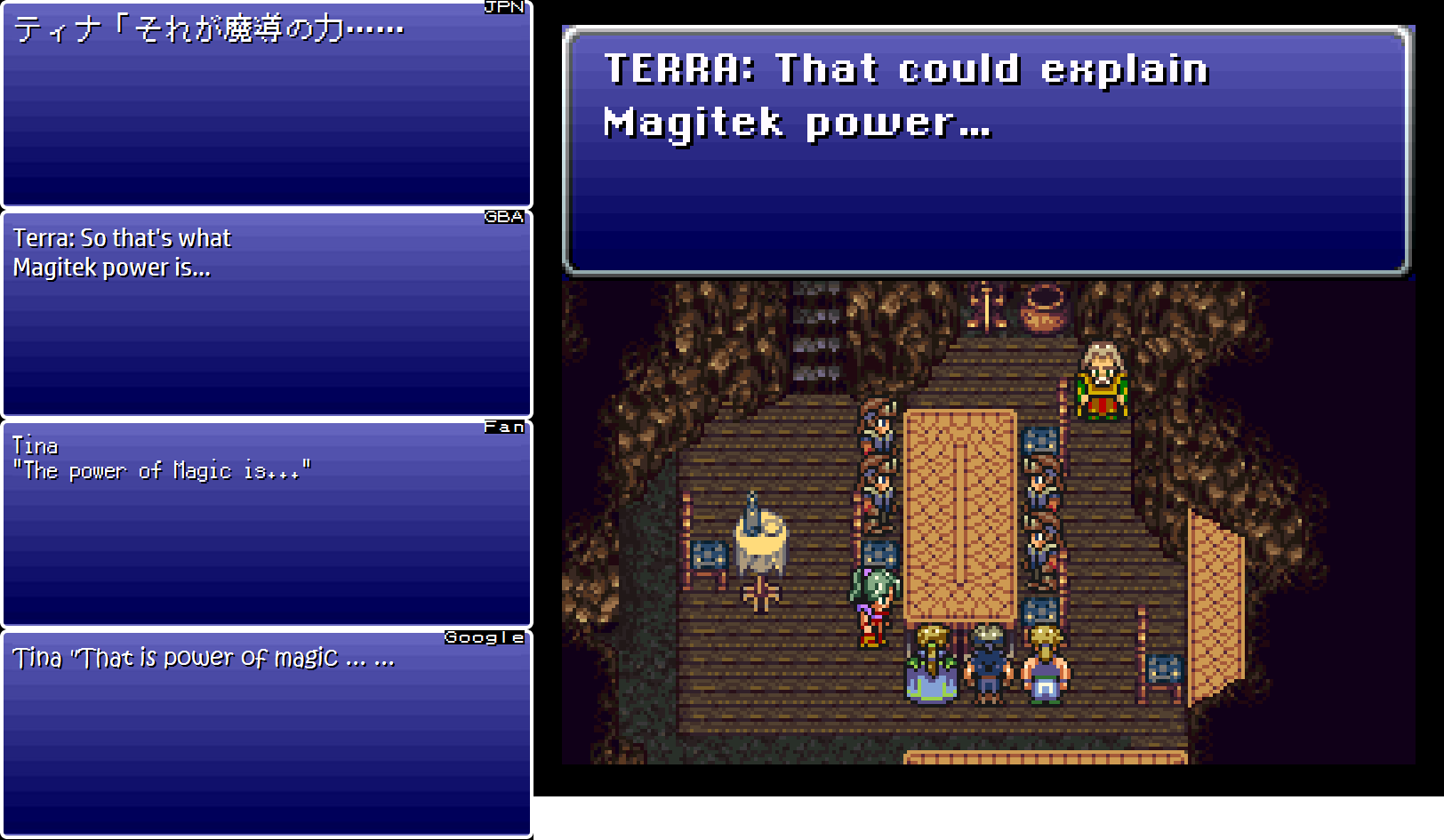
As we saw in Day 1, there are two words used in the Japanese script for magic. The Super NES and GBA translations don’t keep these terms separate all the time, but the fan translation has tried to keep them separate by translating one as “Magic” and the other as “Majick”.
The fan translation has been increasingly inconsistent, though, and this key scene is where keeping them consistent would matter most. Unfortunately, it’s inconsistent here too, which sort of undoes all the hard work and good intentions of separating the words in the first place.
Of course, for the average player, none of this really matters though.
Rewriting History
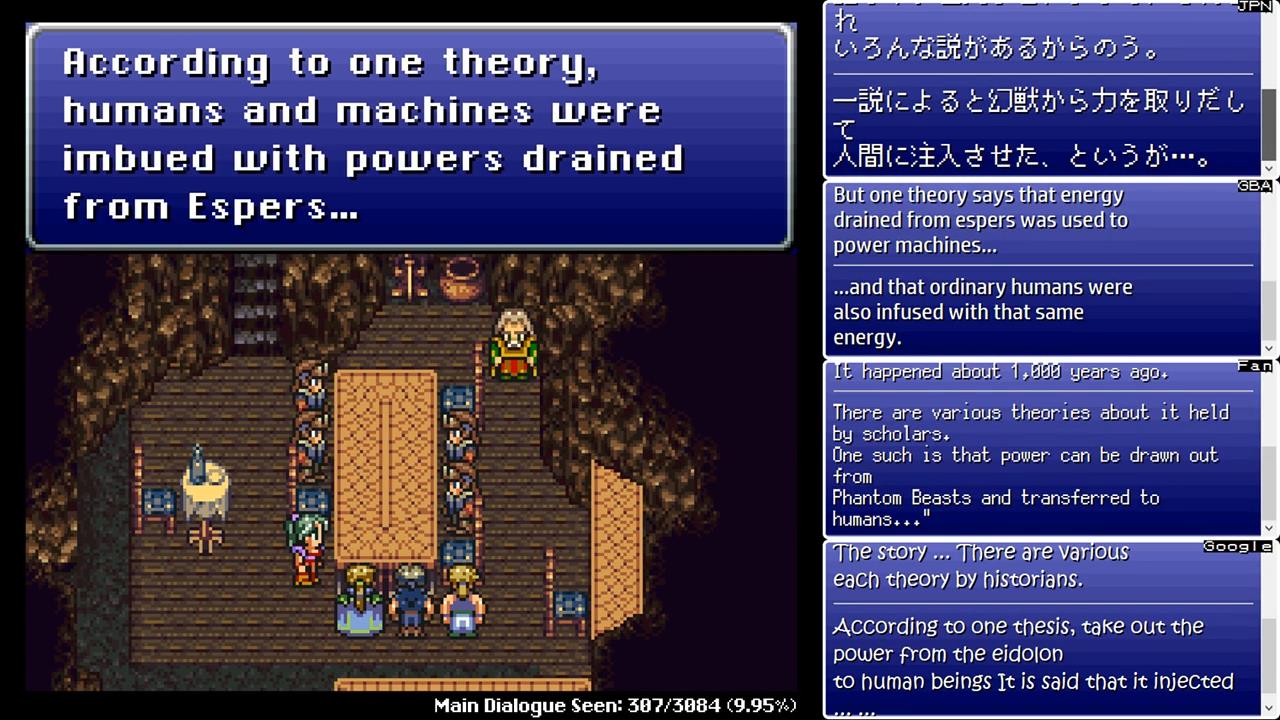
The discussion turns to the magic war that took place 1000 years ago. The original Japanese line here says:
According to one theory, energy was supposedly taken from Espers and injected into humans…
The Super NES translation adds something significant to this:
According to one theory, humans and machines were imbued with powers drained from Espers…
There’s no mention of machines in the original script, and I always got the feeling that machines are more of a modern creation that sets this age apart from the past. And now the Empire has revived magic and is combining it with machine technology to create something the world’s never really seen before. It’s possible I’m wrong here, but that’s just the feeling I always got from the game’s intro and later revelations.
Oddly, the GBA translation also adds a mention of machines getting Esper energy too. The fan translation stays with the Japanese script and says only humans got magical energy back 1000 years ago.
More Machines
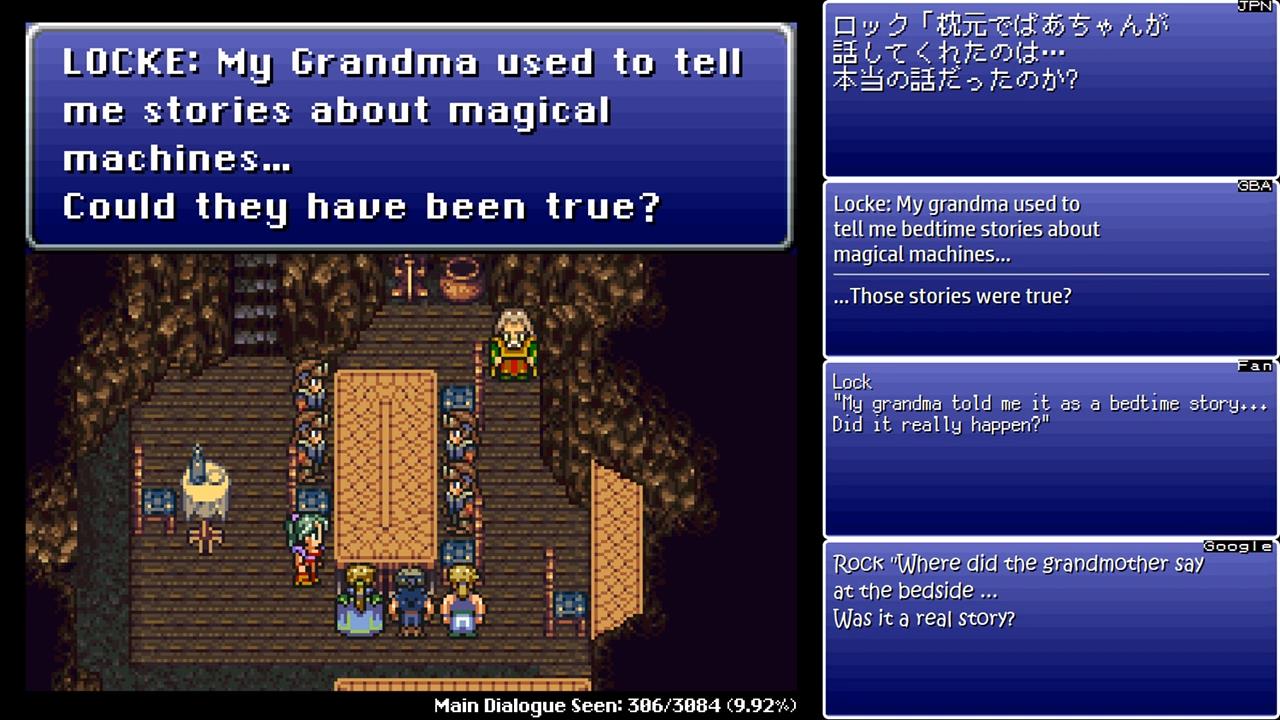
Locke mentions that he heard stories about the old war from his grandmother. In the Japanese version, he says:
Then… the stories my grandma would tell me at bedtime were true?
Details were added out of the blue in the Super NES translation:
My Grandma used to tell me stories about magical machines… Could they have been true?
As we can see, another perplexing reference to magical machines was added into the translation. And, as before, this change was retained in the GBA translation.
I realize it doesn’t matter to most players, but I’m surprised that the translations potentially change the game’s backstory to this extent.
Another Tricky Translation
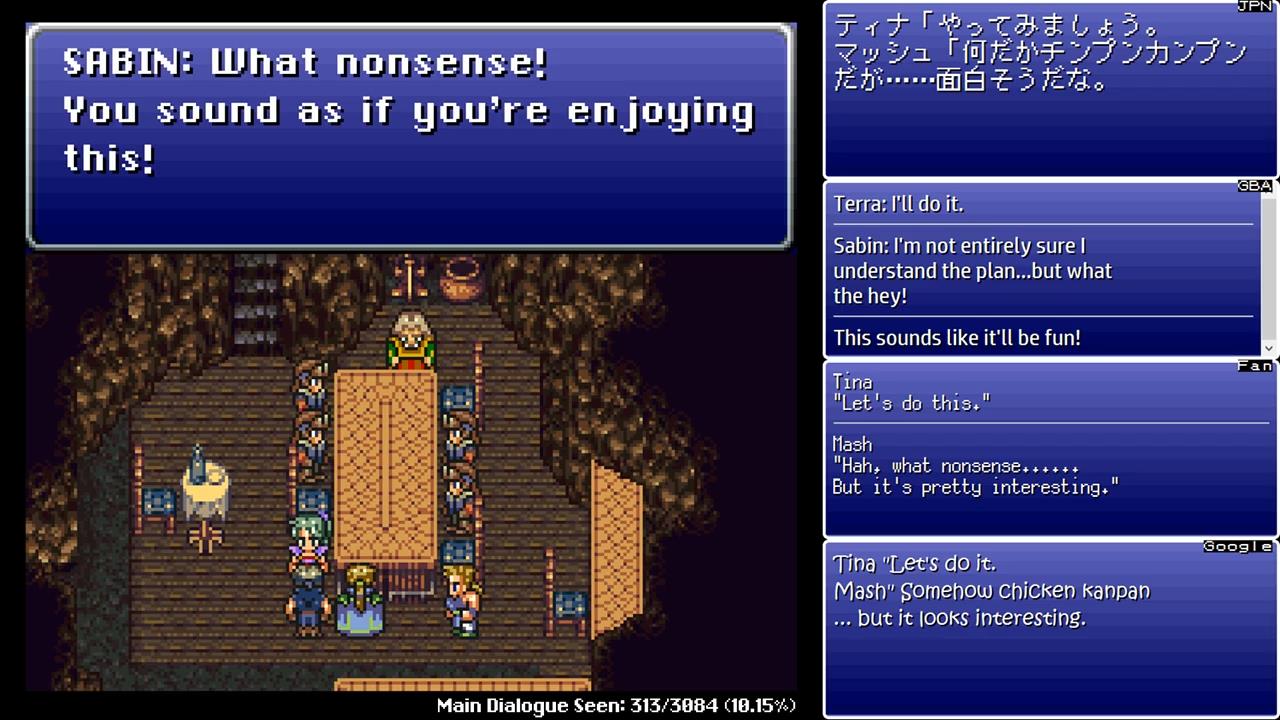
Sabin isn’t very bright, so he’s confused by all the crazy stuff people have been saying during this scene. He just knows they gotta go meet the Esper again in Narshe.
In Japanese he says, “This is all nonsense to me… but it sounds like fun.”
The Super NES translation gets this line wrong by saying, “What nonsense! You sound as if you’re enjoying this!” A big part of the problem here is that the word omoshiroi can mean “interesting”, “fun”, “funny”, and a dozen other slightly different things.
The GBA translation fixes Sabin’s line and gets the text correct. The fan translation seems to mimic the Super NES translation’s mistake in the first half but fixes the second half.
Google sounds like it’s ordering from a Chinese restaurant.
Figaro ≠ South Figaro
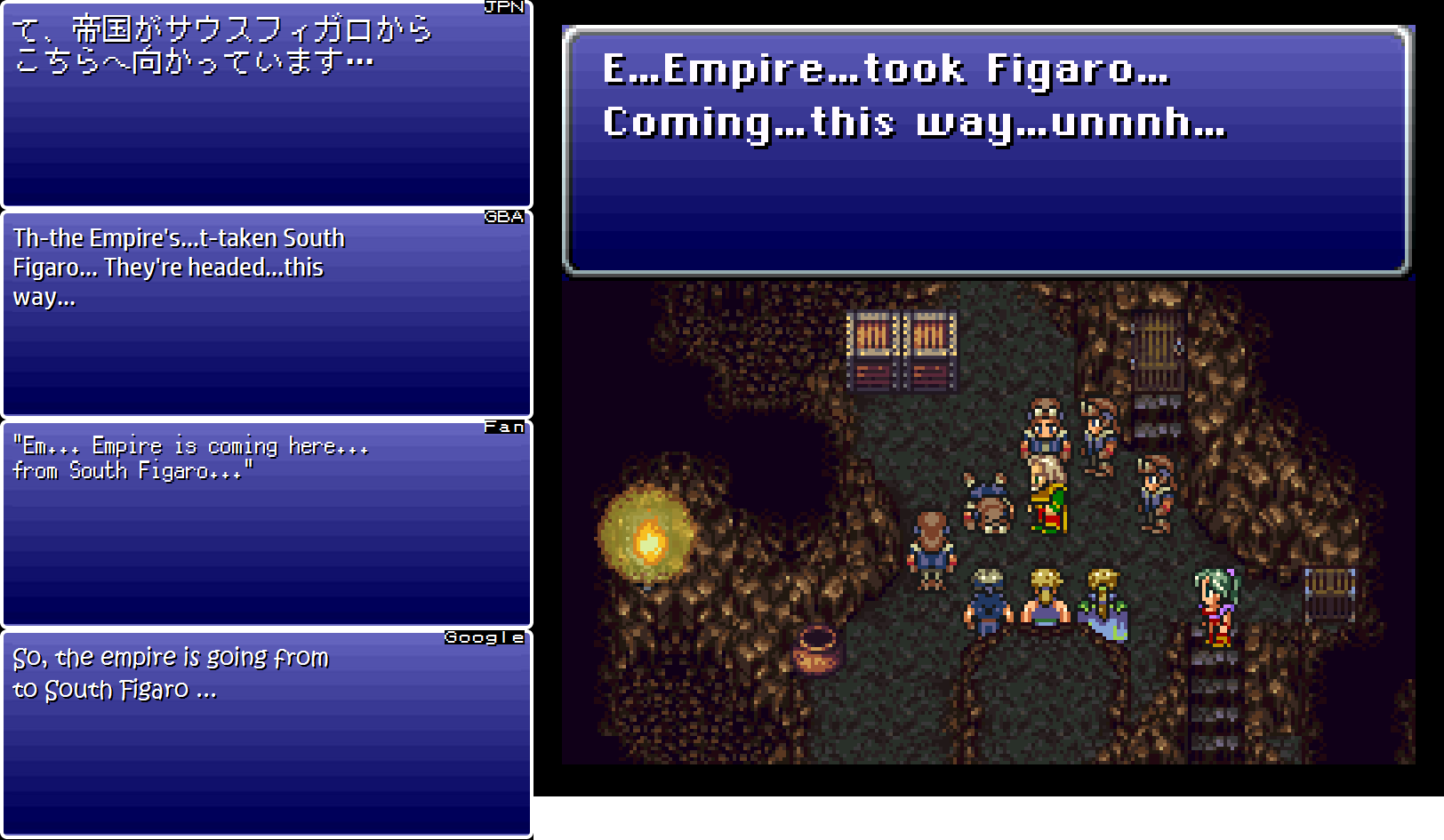
A Returner suddenly shows up with bad news. In Japanese, he says, “Th-the Empire is heading here from South Figaro…”
In the Super NES translation, he gets the facts wrong and says that the “Empire took Figaro”. But we just saw Figaro Castle escape the Empire by burrowing underground.
South Figaro and Figaro are different places and not interchangeable. The GBA translation takes this into account and fixes the problem. The other two translations also keep “South Figaro” in the sentence and not just “Figaro”.
Lete’s Escape
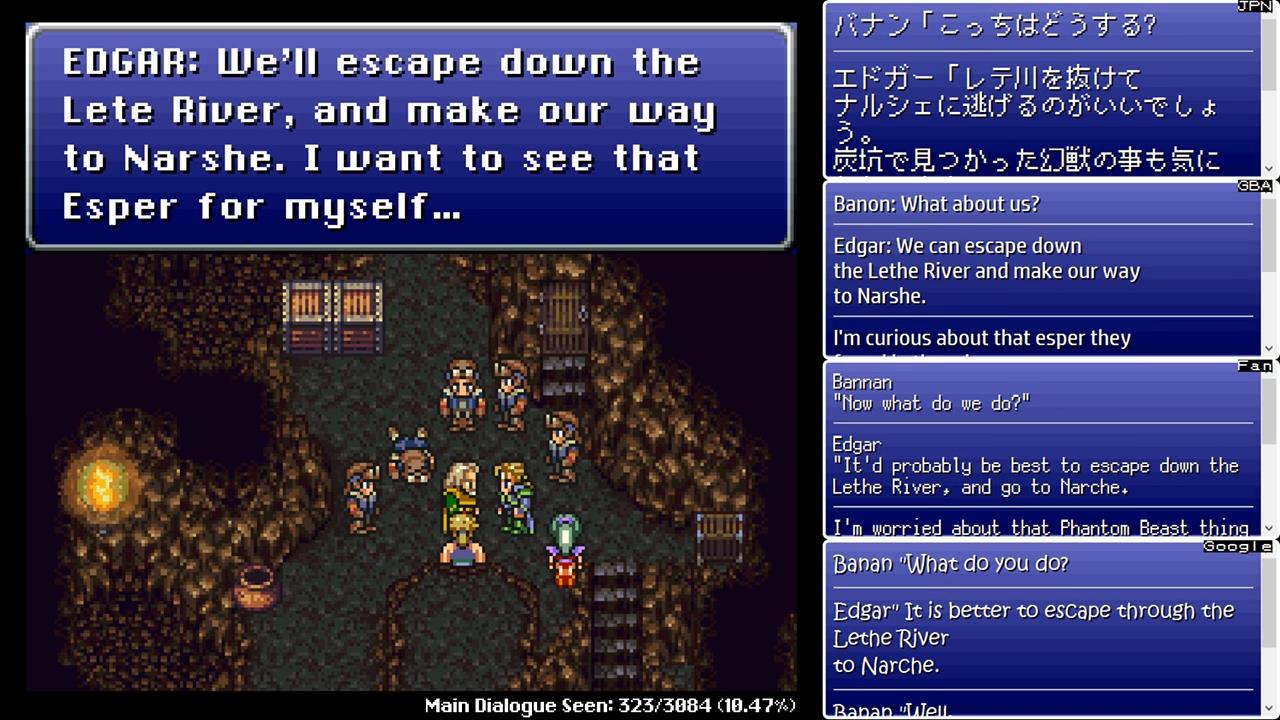
Banon and other people are about to escape via the nearby river. In Japanese, this river is called the レテ (lete/rete) River.
The thing is, apparently this river is a reference to the “River Lethe” from Greek mythology. So we have a combination of a European word and ancient mythology being translated into Japanese and then into English. As we’ve seen previously in this article, this is a big problem for Japanese-to-English translators, especially translators who are rushed and/or have few resources to check.
Because of these factors, the Super NES translator didn’t recognize the connection with old mythology or that the “River Lete” in Japanese is how we’d spell “River Lethe” in English. It’s kind of complicated, but hopefully the problem makes sense.
The GBA translation fixes the name by calling it “Lethe”. Fan translators, if anything, are really good at pinpointing and researching single names – fixing names is often a major reason behind game re-translations, in fact. So it’s no surprise that the fan translation also gets the “Lethe” name correct here.
And wow, even Google gets the name right!
The Magic Phrase
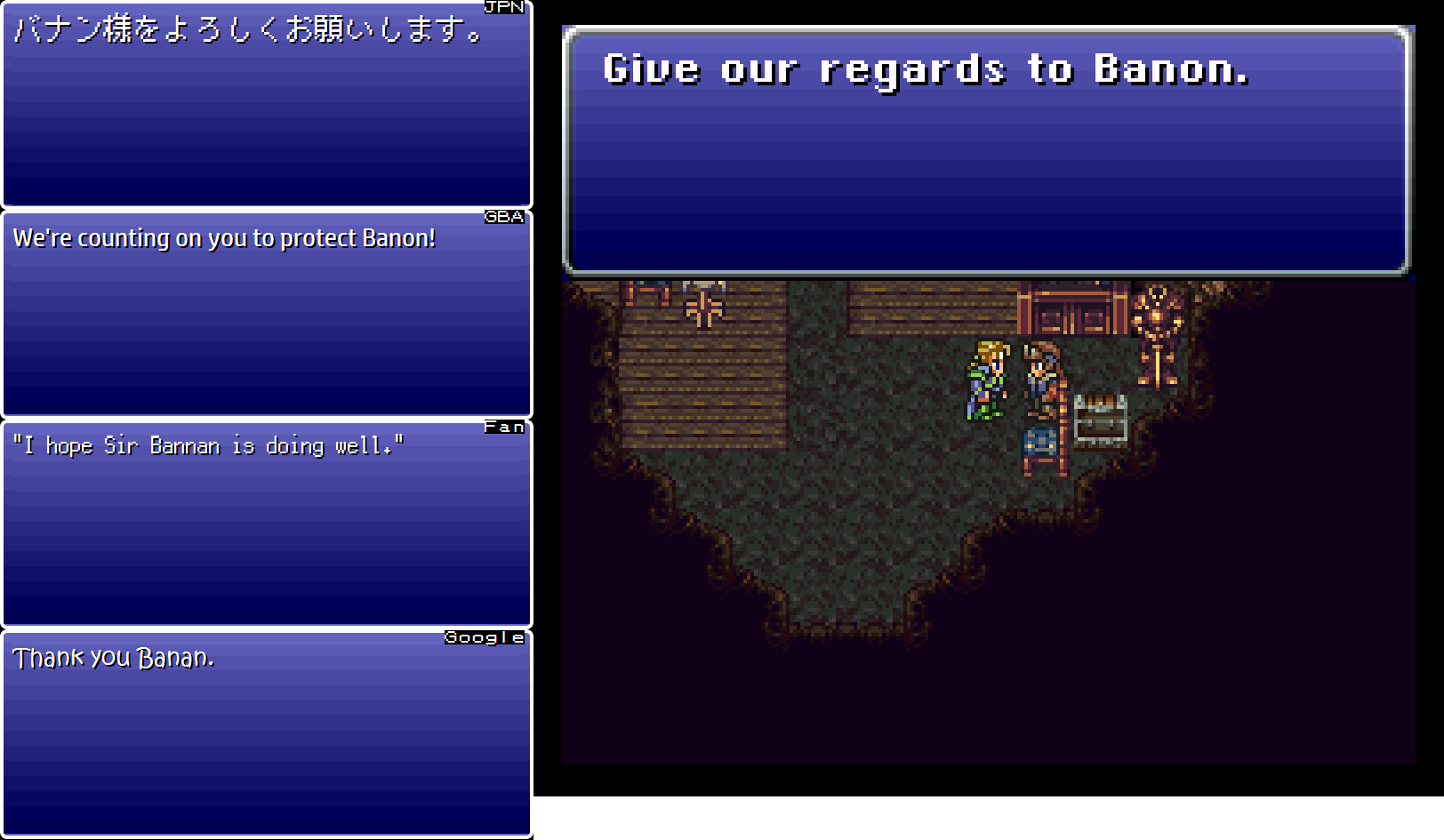
There’s a magic phrase in Japanese that means like a hundred different things: よろしくお願いします (yoroshiku onegai shimasu). If you ever study Japanese, it’s very likely you’ll learn this phrase on your very first day. It’s difficult to explain quickly – it’s definitely another phrase that deserves a Tricky Translation article – but you can read more about it here for now.
The phrase translates into different things in different situations, so you kind of need to be a mind reader whenever translating the term. A few translations include:
- Please treat me/someone kindly
- Thanks for helping me/you in what’s to come
- Please take care of/look after me/someone
- Please give my regards to ____
Anyway, in this line, a Returner says yoroshiku onegai shimasu in regard to Banon, now that Banon has joined the party and is about to escape on the river.
The Super NES translator took this to mean “Give our regards to Banon.” but that doesn’t fit the situation when you’re actually playing the game – he’s right there in the party already!
Instead, the intended meaning here is “please take care of/look after Banon”. We can see that every translation here handles this line very differently. Only the GBA gets it squarely on the head.


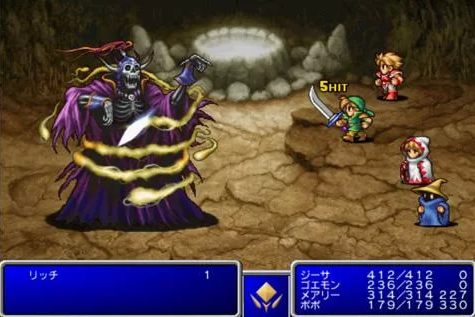
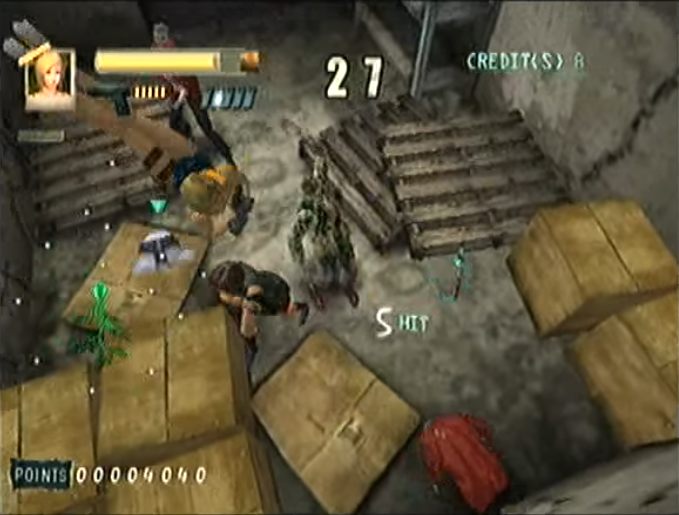
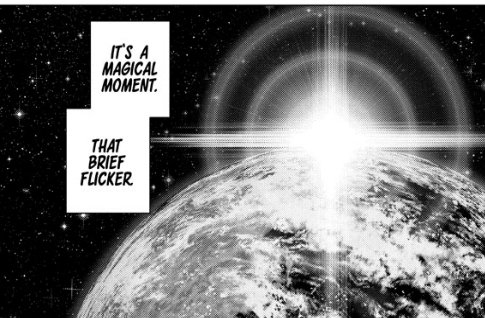
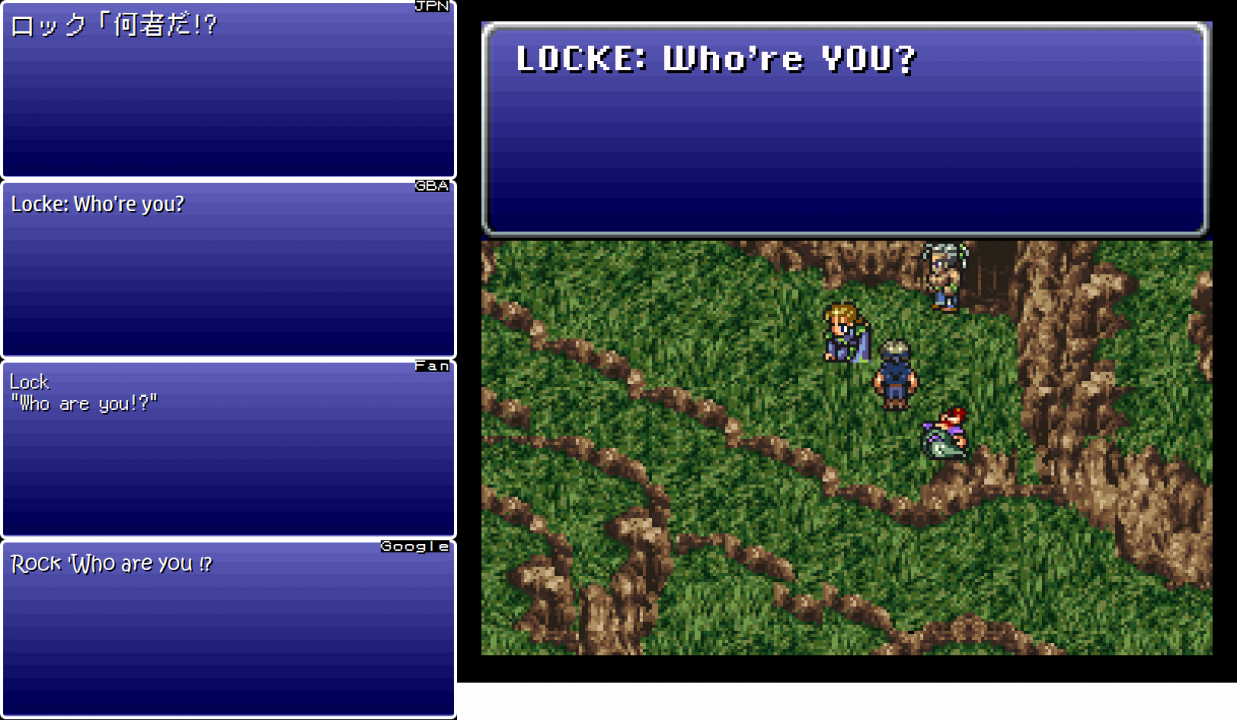

![press start to translate [Final Fantasy IV] press start to translate [Final Fantasy IV]](https://legendsoflocalization.com/wp-content/uploads/2019/08/bbenma.png)
“Fan translators, if anything, are really good at pinpointing and researching single names.” The biggest fail I’ve ever seen on this front is J2E not picking up on “Li’l Murderer” (the floating goblin/imp called “Tricker” in FFII US), leaving it as-is phonetically, and calling the monster “Rilmarder”.
Regarding units of currency, I once wondered why TV shows often had characters secretly show amounts to each other and/or speak vaguely rather than just saying the actual number. At first I thought it was because what’s cheap/expensive in, say, Manhattan, is different from what’s cheap/expensive in West Virginia. While this could still be true, later I realized TV shows keep syndication in mind and that monetary quantities can become stale quickly.
There are also times in TV shows (etc.) that someone will write an amount on a piece of paper, which the audience never gets to see. The person reading the paper often makes mention of “so many zeroes” as well.
I’ve watched my share of Looney Tunes where characters mention fantastically large sums of money, except that by the 2000s those sums would only make someone kinda sorta rich.
“So how do you handle made-up, kanji-only names like this? There are two common solutions: leave them untranslated, like Ryu’s “tatsumaki senpūkyaku” in Street Fighter, or come up with a new, simpler name in English that sort of fits the same vibe as the original name or fits whatever the attack looks like.”
One translation this brings to mind is Gundam True Oddessy/MS Saga. It leaves Bakunetsu-Ken, Senko-Ken and Ankoku-ken untranslated. This comes off as weird because they are clearly variants of G Gundam’s Bakunetsu God Finger (Erupting Burning Finger in the dub), Shining Finger, and Darkness Finger written in kanji. The allusion is now opaque outside of their animation. No idea why they didn’t go with “Burning Fist” (or “Erupting Fist”), “Shining Hand” and “Darkness Hand”.
As for translating 必殺(技), the first Baten Kaitos had some fun with this. In the English version all 6 characters each call their 必殺 different things in battle quotes (“Sword Style”, “Magic”, “Destructive Power”, “Extreme Attack”, “Special Attack” and “Arcana”), which I felt was kinda neat given they all come from completely different cultures and the two who are from the same country (but different lifes within them) have similar ones.
Having a “gym” exist in a fantasy world isn’t that unusual. The concept goes back to at least ancient Greece (hence the full word being the Greek “gymnasium”). Bodybuilders are, though given the muscles on a lot of FF characters (including Vargas) it frankly wouldn’t surprise me.
The GBA script is honestly pretty fantastic so far. I love how well it combines the Woolsey translations with the Japanese text. I was convinced it was just a rewrite of the original Woolsey text at first, but it’s clearly also referencing the original Japanese text as well.
Another thing I like about the GBA script (as well as the FFV GBA script) is that they managed to have a more accurate translation while keeping it fun to read. The Chrono Trigger DS script, by comparison, feels more stiff than the Woosley version and doesn’t really add a whole lot to make up for that.
I never played much of the GBA FF games, but I can certainly agree for the CT DS script. While I admit I have a lot of nostalgia for the SNES originals, there were just so many changes that made the rewrite a bummer to read. And even if “Revive” was a pretty straightforward name, I think “Athenian Water” might be a bit over the top. Although I guess we also have “Phoenix Down”, so…
I’ve noticed in a lot of these screenshots that the fan translation has a lot of awkwardly formatted line breaks.
What always confused me about the story about the box that let all the world’s evils out is that it’s a clear reference to the story of Pandora (which means the deadly sins reference makes no sense) but they refer to a man opening it. Was it gendered in Japanese? I have a doujinshi adaptation of the first bit and it depicts the person as an undetailed male figure.
It uses “1人の男”. 男 is male (boy, man ect. ect. but that’s the basic and important one here), so yes.
The first time I read the Sabin scene in FF3, I was amazed how much gay innuendo the translator had managed to get in with all the bodybuilders and bears.
Given what I remember of Shadow’s hidden backstory, I suspect that the “kill his closest friend for money” bit was supposed to be the first foreshadowing hint at that backstory – something that the attentive player might remember when encountering the actual story later on.
Also, I suspect that both “Banon” and “Bannan” may have been nothing more than attempts to prevent people from reading the name as a truncation of “Banana”, which would be inappropriately and incongruously humorous for the context. (As well as not being pronounced the same way.)
Xenogears translates 必殺技 as “deathblows” as well.
Just want to let you know, the link to Day 1 translation is broken (on the first paragraph).
Oops, thanks! I’ve been moving the pages around and messed that up without realizing it.
By far the most common English equivalent of hissatsuwaza is “signature move”, which is the established term used in English pro wrestling terminology. Japanese pro wrestling terminology uses hissatsuwaza for the same concept.
> A stream viewer by the name of Nalwonk suggested “gilionaire” as an option that could’ve been used, which I thought was clever.
“Gillionaire” actually was used in the English localization of Final Fantasy 10, as the name of a customization that could be placed on weapons and made you gain twice as much money after each battle. I’m not sure if the person on the stream got the idea from there or if they came up with it independently, though. And it also sounds like “jillionaire”, which doesn’t refer to a real number, so it can be guaranteed to never sound less impressive because of real-life inflation!
Hyper Fang from Pokemon has a Japanese name that’s often translated as “Certain-Kill Fang”.
“In the Super NES version, we see that this is mistranslated as “Vargas resented it.” That’s not the case – in fact, Vargas really, really wants to be Duncan’s martial arts successor, enough to attack his fellow student as we soon learn.”
I’ve liked the idea that that adds to Vargas’s anger. “You forced me into training but now you won’t make me your successor?!”
Looking at the more accurate translations, I prefer the SNES one as well.
The idea that Vargas resented Duncan, instead of Duncan thinking little of Vargas, makes the whole situation a little more interesting. Rather than an implied comparison we don’t really need between Sabin (one of our heroes) and his rival (a guy we’ll soon meet and best in combat anyway), the SNES version suggests that Vargas, the also-ran, hated his upbringing but became a product of it anyway, maybe because it’s all he ever knew. Now, he’s now obsessed with becoming the master of something he didn’t want to be in the first place and hates Sabin for usurping that position. That sort of detail for a minor character in a story adds a lot to the world it describes.
Here’s the problem: Duncan really did choose Vargas as his successor. If Duncan really did want Vargas to be his successor, then why is he so angry at Sabin for usurping a position he always had? Why would he kill Duncan for choosing someone else when he never did?
…huh?
Vargas doesn’t know Duncan chose him. Vargas thinks Duncan chose Sabin. That’s the whole point of the conversation between Vargas and Sabin when Sabin appears.
I’m talking about the hypothetical situation that I replied to.
Let’s assume that Vargas really was groomed into a lifestyle that he didn’t want, but became a product of anyway. In the SNES translation, there’s absolutely no indication that Vargas was doing poorly in his training. Meaning we have to assume that he was doing well, meaning there’d be no reason for him to believe that Duncan chose Sabin over him. The reason he thinks Sabin was chosen is because he surpassed him in their training, and Vargas became jealous and thought up a conspiracy.
Even if he still wasn’t doing well, why would Duncan force him into mastery of his teachings and then decide he wasn’t worth being his successor? “Because he’s an asshole” would just be bad writing.
I feel like the “magical machines” stuff actually works better as foreshadowing, since almost all of the leftover stuff from the War of the Magi you see (Ultima Weapon – the boss – the Floating Continent, the Three Gods in their battle forms) appear to be high technology (taking cues from the usual J-horror techno-organic cthulhu stuff), rather than pure ‘magic’. That might be why it was left alone in the GBA version.
It’s worth noting that FF14’s rendition of FF6’s War of the Magi also leans very hard into the high technology stuff, and it has no particular reason to do this other than to be faithful to FF6.
One fun thing that sticks out about the Main Gauche thing – that weapon shows up so much in JRPGs that the Romancing SaGa Minstrel Song localization actually added it where it didn’t exist in the Japanese version! One of the ultimate weapons is called the Left-Hand Sword in Japanese, because it has the unique property of dealing more damage when used by left-handed characters. The localization translated it as Main Gauche.
That game’s translation is really fascinating in terms of how a lot of names had a distinctively “thrown-together” sense that’s hard to explain, and the localization papered that over with a lot of newly-created dramatic-sounding names (i.e. Tiny Feather becomes Avi). It makes for a more coherent setting, but I feel like it loses a lot of the original game’s charm.
Two years and change later, I feel the need to note that “main gauche” literally means “left hand” in French.
Minstrel Song did a very clever weapon naming, far from botching it at all.
Re: Sabre Mountains, I’ve believed it was supposed to be “Sable” Mountains, aka “Black”. Again, it’s a French loanword and it’s fancy enough to to be used as a name for a geographical object.